 10/09/2008 15:34 10/09/2008 15:34 |
|
| | | OFFLINE | | Post: 14.950 | Registrato il: 28/08/2005
| Utente Gold | |
|


OR today.
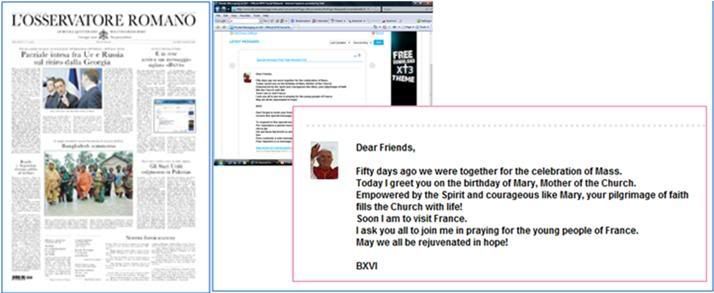
The papal story on Page 1 is, strangely, the Pope's SMS and Facebook message transmitted and posted
on Sept. 9, 50 days since the concluding Mass of World Youth Day in Sydney, in which he asks for
special prayers for the youth of France. A story in the inside pages, 'The sign of Mary at the roots
of Christian faith', anticipates his trip to France. There is also a lengthy article on Joseph
Ratzinger and his intellectual ties to the Verona-born German theologian Romano Guardini (1885-1968),
whose thinking shaped a generation of theologians.
Main story: Partial agreement between the European Union and Russia on the latter's forces pulling out of Georgia -
difefrences remain over unilateral declaration of independence by two Russian-supported breakway provinces of Georgia. Other
stories - Monsoon rains flood a quarter of Bangladesh; Brazil
and Argentina unpeg their currencies from the dollar in initial bid for monetary 'union'; a new rocket attack by US drones on
a suspected terrorist hideout on the Pakistan border with Afghanistan.
[Modificato da TERESA BENEDETTA 10/09/2008 16:43] |
|
 10/09/2008 16:21 10/09/2008 16:21 |
|
| | | OFFLINE | | Post: 14.951 | Registrato il: 28/08/2005
| Utente Gold | |
|
 GENERAL AUDIENCE TODAY
A full translation of today's catechesis has been posted in
GENERAL AUDIENCE TODAY
A full translation of today's catechesis has been posted in AUDIENCE & ANGELUS TEXTS.
Before today's general audience, Pope Benedict XVI delivered the eulogy for the late Cardinal Antonio Innocenti at St. Peter's Basilica at the end of a funeral Mass offered by Cardinal Angelo Sodano.
Later, continuing his catechetical cycle on St. Paul, the Holy Father spoke on the Pauline concept of the Apostolate at the General Audience in Aula Paolo VI, after which the Pope returned to Castel Gandolfo.
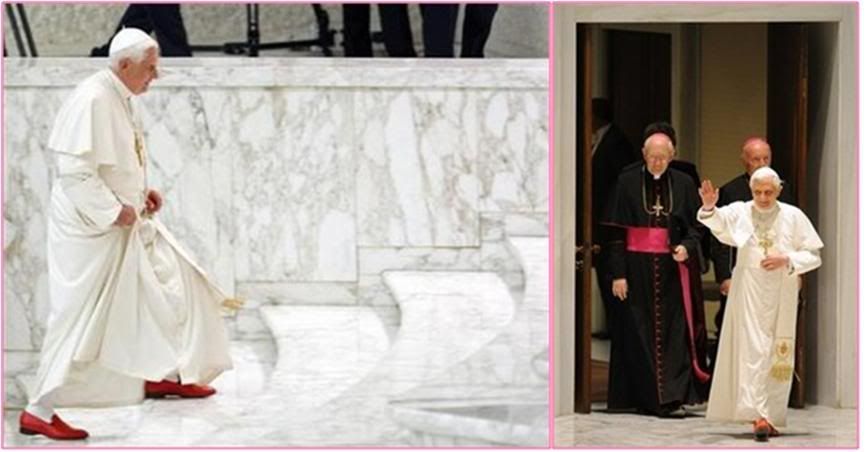
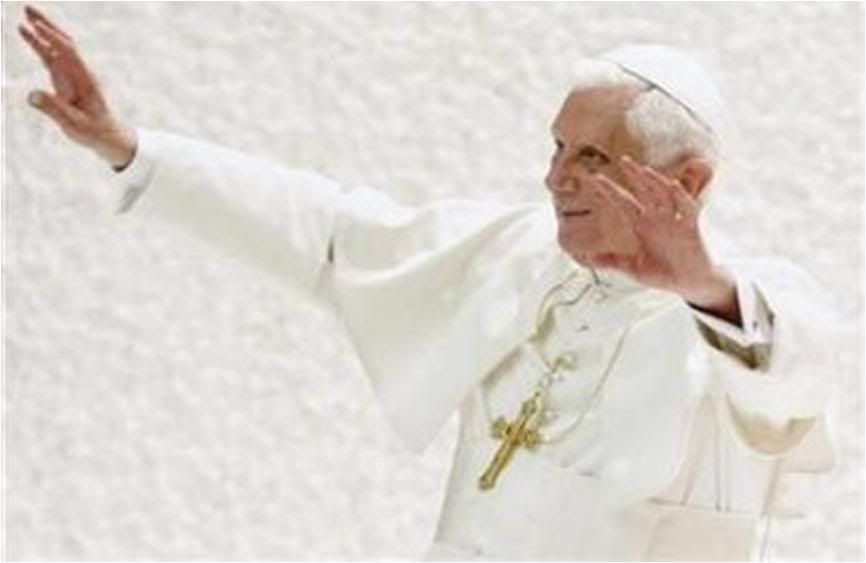 Here is the English synthesis of today's lecture:
Here is the English synthesis of today's lecture:
In today’s catechesis we turn to Saint Paul’s view of what it means to be an apostle of Jesus Christ.
Though he did not belong to the group of the Twelve, called by Jesus during his ministry, Paul nevertheless claims the title for himself because he was chosen and transformed by the grace of God, and shared the three principal characteristics of the true apostle.
The first is to have seen the Lord (1 Cor 9:1) and to have been called by him. One becomes an apostle by divine vocation, not by personal choice.
The second characteristic also underlines the divine initiative: an apostle is someone who is sent and therefore acts and speaks as a delegate of Christ, placed totally at his service.
The third characteristic is dedication to the work of proclaiming the Gospel and founding Christian communities. Saint Paul can point to his many trials and sufferings that speak clearly of his courageous dedication to the mission (cf. 2 Cor 11:23-28).
In this context he sees an identification between the life of the apostle and the Gospel that he preaches; the apostle himself is despised when the Gospel is rejected. Saint Paul was steadfast in his many difficulties and persecutions, sustained above all by the unfailing love of Christ (cf. Rom 8:35-39).
May the example of his apostolic zeal inspire and encourage us today!
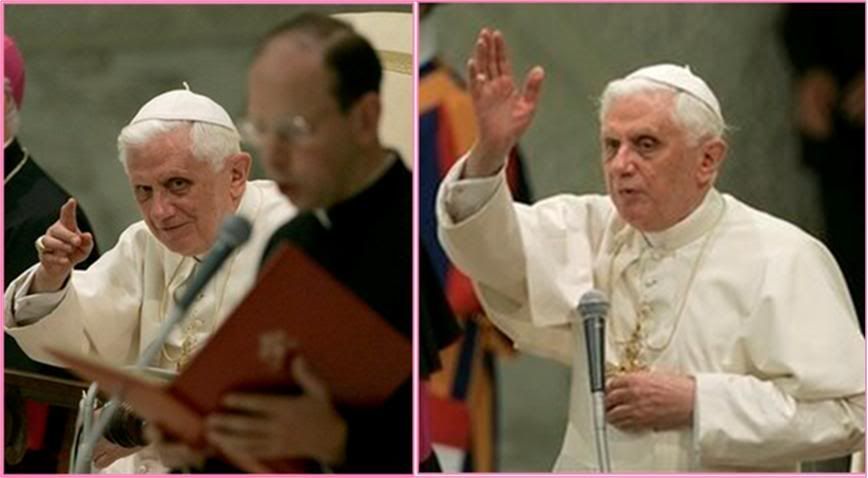 POPE'S MESSAGE FOR FRANCE
POPE'S MESSAGE FOR FRANCE
ON THE EVE OF HIS VISIT
At the end of his pluri-lingual greetings this morning, the Holy Father delivered a special greeting to the French people in connection with his visit to France on Sept. 12-15. Here is a translation:

Dear brothers and sisters,
On Friday I will undertake my first pastoral visit to France as the Successor of Peter. On the eve of my departure, I wish to extend my heartfelt greetings to the French people and all the inhabitants of this well-beloved nation.
I come to you as a messenger of peace and brotherhood. Your country is not unknown to me. I have had the joy of being there several times and to appreciate its generous tradition of welcome and tolerance, as well as the solidity of its Christian faith and its exalted human and spiritual culture.
This time, the occasion for my visit is the celebration of the 150th anniversary of the apparitions of the Virgin Mary in Lourdes. After visiting Paris, your capital, it will be a great joy for me to join the crowds of pilgrims who have come to follow the Jubilee Way, in the footsteps of St. Bernadette, to the Grotto os Massabielle.
I will offer intense prayers at the foot of Our Lady for the intentions of the entire Church, particularly for the sick and those who are most needy, but also for the peace of the world.
May Mary be, for all of you, particularly for the young people, the Mother who is always there for the needs of her children, a light of hope who illumines and guides your way.
Dear friends in France, I invite you to join me in prayer that this trip may bring abundant fruits. In the happy anticipation of being among you soon, I invoke on everyone, on your fmailies and your communities, the maternal protection of the Virgin Mary, Our Lady of Lourdes.
God bless you!

BENEDICT XVI RECALLS
CARDINAL INNOCENTI

VATICAN CITY, 10 SEP 2008 (VIS) - Benedict XVI spoke of the life of Cardinal Antonio Innocenti in a homily he pronounced this morning in the Vatican Basilica, at the end of a funeral Mass for the prelate, who died on 6 September at the age of 93.
The Mass was offered by Cardinal Angelo Sodano, dean of the College of Cardinals, concelebrating with other cardinals currently present in Rome.
In his homily, the Pope sketched a brief biography of the late cardinal, who was a native of the Italian diocese of Fiesole. He was ordained priest in 1938, after which he taught at the diocesan seminary, "helping the bishop on his pastoral visits during World War II. In that dramatic period he stood out for his selflessness and generosity in helping people and saving those destined for deportation. For this he was arrested and condemned to be shot, but the order was reversed as he stood before of the firing squad".
The Holy Father then recalled how Cardinal Innocenti entered the diplomatic service of the Holy See, being "appointed as pontifical representative to Paraguay and receiving episcopal ordination in 1968. He was later recalled to Rome to assume the role of secretary of the Congregation for the Sacraments and Divine Worship. Later, in 1980, he was sent as apostolic nuncio to Spain where he twice welcomed my venerated predecessor John Paul II on pastoral visits". John Paul II made him a cardinal in 1985.
This Italian cardinal, the Pope went on, "continued to provide his valuable services to the Supreme Pontiff, as prefect of the Congregation for the Clergy, president of the Pontifical Commission for the Cultural Patrimony of the Church and of the Pontifical Commission "Ecclesia Dei".
Referring to Cardinal Innocenti's episcopal motto, "Lucem spero fide", Benedict XVI concluded his homily by expressing the hope that "faith and hope may give way to the greatest of all truths, the charity which will never end".
After the eulogy, the Pope administered the Ultima Commendatio and Valedictio to complete the obsequies.
THE REST OF THE POPE'S DAY

The Holy Father was scheduled to have an afternoon meeting with
- Cardinal William Joseph Levada, Prefect of the Congregation for the Doctrine of the Faith,
and Archbishop Luis Ladaria Ferrer, recently named Secretary of the CDF.
* * * * * * * * * * * * * * * * * * * * * * * * * * * * * * * * * * * * * * * * * * * * * * * * * * * * * * * * *
New online feature in
 -
Links to a very convenient archive to look up documents that have to do with Benedict XVI is now on the OR home page:
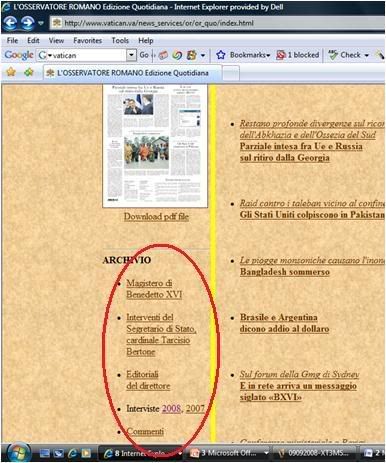
[Modificato da TERESA BENEDETTA 11/09/2008 05:22] |
 10/09/2008 16:21 10/09/2008 16:21 |
|
| | | OFFLINE | | Post: 14.952 | Registrato il: 28/08/2005
| Utente Gold | |
|
 Pope to find unlikely ally
Pope to find unlikely ally
in France's Sarkozy
By Philip Pullella

VATICAN CITY, Sept. 10 (Reuters) - Pope Benedict and French President Nicolas Sarkozy would appear to be unlikely allies in a battle to inject more Christian values back into Europe.
Yet when he welcomes Benedict to France for a four-day trip to Paris and Lourdes starting on Friday, Sarkozy, twice divorced and now married to ex-supermodel Carla Bruni, will likely have the German Pope nodding in agreement more than once.
Sarkozy, who considers himself a "cultural Catholic" and attends Mass only occasionally, has been calling for a more active role for religion in public life and greater recognition of Europe's Christian roots.
Only last Saturday in Sardinia, the Pope said Italy needed a new generation of Catholic politicians committed to using their religious beliefs to shepherd the country's future.
While no one expects the Pope to go that far in France, where the split between Church and State is enshrined in the national identity, Benedict is expected to push for what he has called "a healthy secularism."
"I know people accuse me of being much too interested in religion ... I am not questioning the secular system," Sarkozy said last January after making a string of positive comments on faith and repeatedly citing God in speeches abroad.
Since the introduction in 1905 of a law on laicite - the French concept of the separation of Church and State - bringing religion into public affairs has been a major taboo.
But Sarkozy has branded this a "negative laicite," and wants a "positive laicite" that would value the hope faith brings and allow state subsidies for faith-based groups, Christian or not.
Benedict and Sarkozy might mention this in short speeches after their meeting at the president's Elysee Palace on Friday. "Everybody is waiting to see what they say," said Frederic Lenoir, editor of the French bimonthly Le Monde des Religions.
French Cardinal Jean-Louis Tauran told the Italian Catholic newspaper Avvenire he expects the Pope to speak of "healthy secularism" at the Elysee Palace, his first stop after arrival.
But Catholicism in France, known as the "eldest daughter of the Church" due to its deep Christian roots, is anything but healthy.
Officially, some 75 percent of the French were baptized but far fewer identify themselves as Catholic and those who attend Mass on Sunday has fallen below 10 percent by most estimates.
"Undoubtedly, the level of religious practice is very low and the priest shortage is dramatic," Tauran said.
At the same time, France's committed Catholic minority has a new self-confidence and speaks out more openly than in the past. Lenoir said Pope John Paul's visit during the Paris World Youth Day in 1997 helped boost their Catholic identity.
One of the Pope's main speeches will be on Friday evening at his "meeting with the world of culture" -- intellectuals, artists and scientists assembled in a renovated medieval hall.
He will make that speech on the second anniversary of his controversial lecture at Regensburg, Germany, which angered Muslims who saw it as implying that Islam was violent and irrational.
He also plans brief meetings with Jews and Muslims.
Benedict will spend most of his time in Lourdes, in the foothills of the Pyrenees. This year is the 150th anniversary of when the Virgin Mary is said to have appeared to a peasant girl, Bernadette Soubirous, 18 times in 1858.
In the past 150 years, the Church has recognized as "miracles" 67 medically inexplicable healings of sick pilgrims who visited Lourdes.
Some six million people a year, many of them sick or disabled, visit the city to drink or bathe in its spring waters.
9,200 security agents
for Pope's France visit

PARIS, Sept. 10 (AP) - French authorities will mobilize 9,200 police and other security officers for Pope Benedict XVI's visit to Paris and Lourdes this week, the Interior Ministry said Wednesday.
French President Nicolas Sarkozy and first lady Carla Bruni-Sarkozy plan to greet the pontiff when he arrives at Orly airport Friday before hosting him for a reception at the presidential palace, the President's office said.
The Interior Ministry said in a statement that it is working with Vatican authorities to "ensure the Pope's safety and manage the crowds of faithful."
A Saturday morning Mass in central Paris is expected to draw between 150,000 and 200,000 people, the ministry said.
The Pope's three-day visit will be his first to France since he became Pontiff in 2005. In addition to his visit to the French capital, he will go to the Roman Catholic shrine of Lourdes in the south of France.
[Modificato da TERESA BENEDETTA 11/09/2008 04:15] |
 10/09/2008 17:20 10/09/2008 17:20 |
|
| | | OFFLINE | Post: 3.311 | Registrato il: 23/11/2005
| Utente Master | |
|
Cardinal Tauran on the pope's trip to France
By John L Allen Jr
National Catholic Reporter
Created Sep 10 2008 - 01:15
French Cardinal Jean-Louis Tauran, 65, is a veteran Vatican diplomat, the former “Foreign Minister” of the Holy See, who today serves as President of the Pontifical Council for Interreligious Dialogue. On September 10, L’Avvenire, the official newspaper of the Italian bishops’ conference, published an interview with Tauran by noted journalist Gianni Cardinale. Among other topics, Tauran discussed the upcoming visit of Pope Benedict XVI to France. The following is an NCR translation of that interview.
Your Eminence, on Friday Benedict XVI leaves for France, and you, along with Cardinals Roger Etchegaray and Paul Poupard, will be part of the papal entourage. Some have written, including John Allen of the National Catholic Reporter, of a Ratzinger who is a Francophile. What do you think of this definition?
I have to say that this pope speaks a splendid French, elegant and without any German accent. Actually, he speaks French with an elegance that’s rare even among my countrymen. Regarding Ratzinger’s particular predilection for France, I’m a eyewitness, so to speak.
In what sense?
On May 11, 1998, the French Ambassador to the Holy See at that time, Jean-Louis Lucet, presented then-Cardinal Ratzinger with the insignia of a Commander of the Order of the Legion of Honor. The ceremony took place at the Villa Bonaparte, and I was present. Ratzinger delivered a brief but very rich speech in which he showed all of his love for France, for the French church and for French culture. The future pontiff confessed to always having been, since his youth, a ‘zealous admirer of sweet France.’ He talked about all the French authors he read: Catholics such as Claudel, Bernanos, Mauriac, Peguy, but also secular writers such as Anouilh and Sartre. Then, he turned to the great French theologians such as Congar, Danielou, and Chenu, and he spoke at length about Fr. De Lubac. At the end, he said: ‘I congratulate France for these great personalities, and I thank France for the gift of its humanistic culture.’ He ended with a moving appeal: ‘Long live friendship between France and Germany! Long live France!’
Do you have other memories of the bonds between France and Cardinal Ratzinger?
Certainly. The speech he gave in Normandy in 1992 comes to mind, when he was inducted into the Academy of Moral and Political Sciences of the Institute of France. It was titled, ‘In search of peace.’ There are also the numerous private trips Ratzinger has taken in our country, such as those to the abbeys of Le Barroux and Fontgombault. There’s the celebrated lecture he gave at the Sorbonne in 1999. All these events demonstrate the extraordinary predilection of Ratzinger for France.
What will be the themes of the trip the pope is about to take to Lourdes and Paris?
Obviously, I don’t know the content of the papal speeches. It’s a pastoral visit, and therefore the religious dimension will be preponderant. Nonetheless, I believe I know what the expectations are in France of the pope. They include a clear discussion of healthy secularism when he speaks at the Elyse, and an illuminating word on culture when he speaks to academic world.
You were favorably impressed with the words of Nicolas Sarkozy when he took possession of his seat as a Canon of St. John Lateran in December 2007. How would you evaluate the subsequent steps of the president?
His words were very encouraging. I have to confess, however, that for the present, they have not been followed by concrete actions. Legal recognition of the degrees issued by ecclesiastical universities and faculties, for example, has not been granted, despite the fact that it was mentioned at the Lateran and it would not be a very complicated reform to undertake.
How is the health of the church in France that will meet the pope?
Undoubtedly, the level of religious practice is very low and the priest shortage is dramatic. Christianity, in contrast with the situation in Italy, does not have influence on public life and doesn’t inspire public debate. But, there are small signs of hope. There’s a small increase in vocations, which, to tell the truth, are most robust among the traditionalists. Also, this summer there was some good news from Lourdes.
What are you referring to?
On the occasion of the anniversary of the apparitions, there’s been a great influx of pilgrims … many young people, many families with lots of children. It’s a truly moving witness of faith, which even the mass media have noticed. They’ve treated this phenomenon with curiosity and respect, without the tones of superiority and facile irony that we’ve seen in the past. For France, believe me, that’s a small miracle.
 And here I was just about to translate Cardinal Tauran's interview... Allen saves me one translation because there is a wealth of articles out there now on the eve of the visit to France!
And here I was just about to translate Cardinal Tauran's interview... Allen saves me one translation because there is a wealth of articles out there now on the eve of the visit to France!
TERESA
CARDINAL RATZINGER'S
VISITS TO FRANCE
Here's a summary, translated from the Archdiocese of Paris site for the Papal visit, of Cardinal Ratzinger's previous visits to France:
Cardinal Ratzinger came to France many times. The most significant visits were:
- Lectures on "The transmission of faith and sources of the faith" in Lyon and Paris, on Jan. 15-16, 1983, at the request of the Archbishops of those two cities, Mons. Decourtray and Mons. Lustiger, respectively.
- Admission to the Academy of Moral and Political Sciences of the Institut de France, Paris. Acceptance Address - "Andrei Sakharov: Science, Conscience and Freedom", November 7, 1992.
- Lecture on 'The truth of Christianity", University of Paris, Sorbonne, November 27, 2000.
- Lecture during the Lenten series at Notre Dame de Paris, "Hell is where God is not", April 7, 2001.
- Visit to Normandy as the personal representative of John Paul II for the 60th anniversary of D-Day, June 4-6, 2004, at which he gave two major speeches, one at the German cemetery in le Cambe, the other his homily at the Cathedral of Caen.
In 1998, he was named a Commander of the French Legion d'Honneur (referred to by Cardinal Tauran in his interview). [I posted a translation of his acceptance speech on that occasion in the thread IN HIS OWN WORDS on 12/13/05 - the second post on that thread-
freeforumzone.leonardo.it/discussione.aspx?idd=354533
[Modificato da TERESA BENEDETTA 11/09/2008 05:18] |
 11/09/2008 02:10 11/09/2008 02:10 |
|
| | | OFFLINE | | Post: 14.955 | Registrato il: 28/08/2005
| Utente Gold | |
|
 Cardinal Vingt-Trois:
Cardinal Vingt-Trois:
'The French will discover
Benedict XVI in flesh and blood'
Interview by Nicholas Seneze
Translated from

Sept. 10, 2008
Cardinal Andre Vingt-Trois, Archbishop of Paris, talks to LA CROIX about what is at stake in the Pope's visit to France. As he has said in other interviews, he sees it as an opportunity for the French people to get to know Benedict XVI.
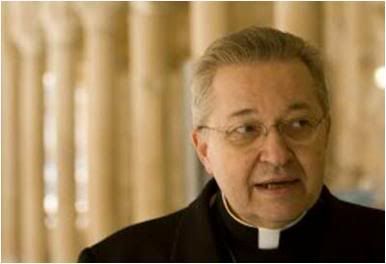 The Pope is arriving Friday for his first apostolic visit to France. What do you expect of this visit?
The Pope is arriving Friday for his first apostolic visit to France. What do you expect of this visit?
A lot of things. The first being to experience a most intense period: for three full days, the Pope will meet and 'welcome' the French people. There will be time for dialog, for prayer, and for teaching.
This trip will certainly demonstrate very strongly the communion of the bishops of France with the Pope.
At the same time, I think that this visit will allow the French people, outside of the few who are already well informed, to get to know him. Of course, there are those who already know him from his visits and discourses at Notre Dame, at Caen (for the 2004 D-Day anniversary), at the Academie des Sciences Mrales et Politiques, or at the Sorbonne...
But all those events together really involved a rather restricted and specialized audience. It is true that many French pilgrims have gone to Rome. But many Frenchmen, even Catholics, have not had the opportunity to see Benedict XVI in flesh and blood: and they will discover his personality - not simply read his texts or discourses, but to see what he is, the way he relates to others... All this will put a more human and more concrete form to their image of the Pope.
Is the Pope coming to speak to the Church of France or to French society?
First of all, he is coming to pray to the Blessed Virgin - don't forget that the primary reason for his pilgrimage is the anniversary of Lourdes. And his Mass with the bishops of France on Sunday morning and his Mass for sick pilgrims on Monday will definitely be the highlights of his trip.
But Benedict XVI will also get to meet French society, particularly during his passage through Paris. He will be received at the Elysee, he will give an address at the College des Bernardins, he will celebrate Vespers at Notre Dame, meet the youth and say Mass at the Invalides.
What will he say to the 'world of culture' whom he had requested to meet?
French Catholics, like many others around the world, face a cultural plurality, a diversity of beliefs, and a certain break-up of the concept of the human being. They question whether they still have something to say. What will be their way out? To seek refuge within themselves, tending their own little fires, without regard for what is happening around them? Or should they not enter into contact and dialog with the anthropological, cultural and religious plurality around them?
The Pope has said elsewhere that a recourse to reason is the only way for such a dialog - that it allows a universality of communication. This means that dialog is not undertaken on emotional grounds but on rational bases, and therefore Christians should develop their capacity for rational communication.
"To give a reason for the hope that is in us", as it is said in the first Letter of Peter - this means carrying on a coherent discourse, which may even be intellectually simple, but it must be heard. And that is what the Pope does with his own discourses - here, too, he will 'talk the talk' himself, and every one will understand.
What image does Benedict XVI have of France?
I know that he knows the French situation very well - both that of the Church and of society. He knows France is not Germany, nor the United States, nor Australia, so he is not going to address us the same way he did in Cologne or New York or Sydney.
He is informed enough and aware of nuances to know that the traditional place of Catholicism in France is both much more central as well as much more disputed.
On December 20, 2007, at the Lateran Palace in Rome, Nicolas Sarkozy gave an address that raised a lot of controversy. What was the reaction of the Church of France at the time? And is it still the same?
My own position - which I expressed at the time - is that the discourse was not really new - everything was already in Sarkozy's 2004 book ( La République, les Religions, l’Espérance, Cerf, 2004).
What was new was that the President of France was saying it while in office. We must also point out that he followed this up with his address in Riyadh on January 14. Sarkozy is not specifically speaking of Catholicism but of his vision of the role of religion in society.
But why were the reactions so strong?
His address could be interpreted two ways. The first is political - to say that, just like Bonaparte acknowledged in effect when he signed a Concordat with the Vatican, religion is an ingredient of society, and if one wants social progress, then one must work with it. I can see why some people understood Sarkozy to mean it this way.
The second interpretation is more philosophical: society, any society, cannot define itself without a reference to the transcendent, and transcendence is the sphere of religion. I think that even if this consideration also has political extensions, it is a profound conviction for the President of the Republic.
And I don't think it is scandalous at all that he says so in public. I would like to give him credit that it is his sincere conviction.
And do you, like others in the Church, expect concrete translations?
I do receive every day concrete translations: a climate of consideration and dialog, the possibility of saying certain things to the President of the Republic, to the Prime Minister or to the movers of society.
Don't you fear that the controversy will re-start because of this trip, with the secularists mobilizing?
I must say I am quite surprised, because apart from a few groups which have stirred up, I do not see anything that resembles what took place in 1996. [Before John Paul II's last visit to France, for World Youth Day in Paris.]
On the part of the Church, have the French Catholics mobilized to welcome Benedict XVI?
If I am to believe the reports coming from the different provinces of France, the mobilization has been growing in strength, for the faithful to participate in the events.
A number of them will be attending not just the Mass at the Invalides, but will then proceed to Lourdes to follow the Pope. I think this shows that the visit corresponds to a real anticipation.
Benedict XVI's 'style - which is frank and direct - will that be effective here?
I have not said that Benedict XVI has a more cutting style than John Paul II. Not have I remarked that during his trip to the United States, he provoked tremors by saying cutting words! This Pope says things calmly and clearly, but he has absolutely no intention to provoke a controversy nor even to provide an excuse for one. He is a man who listens, who tries to confront the currents of thought in our time.
And his liturgical style?
At the Vespers on Friday evening, we will be using the customary liturgy ['liturgie habituelle' - I am not sure if he means what they have been using habitually since the 1970 reform, or what has been habitual traditionally in the Church] at Notre Dame. In the same way, the Mass at Invalides will be the Catholic Mass. One should not under-estimate the capacity of Christians to adhere to a diversity of forms. [In short, Vingt-Trois evades the question about Benedict's liturgical preferences! And he succeeds in throwing off his interviewer who does not then make any reference to Summorum Pontificum, as I think he was leading up to!]
The bishops who will be meeting Benedict XVI on Sunday - will they be able to dialog with him?
The meeting was explicitly requested by the Pope - for which I am very glad - but it will not be long enough. The Pope has to say a certain number of things. I don't doubt there will be time for personal interaction, but not public discussions.
Will you be their spokesman in some way?
In welcoming him, I will say a few things, as I already did during the preparation for this trip, in presenting to him the context of the bishops conference and the sensitive questions we are faced with. He will certainly make good use of that.
For example, we described to him the reorganization of the very pastoral fabric of France, which concerns many rural dioceses, and which some may see as the 'disappearance' of the Church. The bishops who have to put these changes into effect will try all they can to use it as an occasion for renewal.
But it is one thing to have this intention, and quite another to carry it out. It is therefore very important that they are encouraged in their efforts.
There's also the call to priesthood. All the bishops have been trying, in different ways, to launch a pastoral ministry for vocations.
I also referred to the Church teaching on respect for the dignity of human life in our society, through bioethics or through social and economic life. We will not lack for issues.
I do have a last message for our people: Please come. You must come [to the Pope's events]. I understand that for many, it will not be possible - I think of the aged, the sick, those in jail...and I am happy that TV broadcasts will allow them to follow the visit. But it's not the same as being there. All those who can come should come - there will be a place for everyone.
[One must note that except for the events held indoors, no tickets or reservations are required for the Paris events. The routes of the Popemobile on both days that the Pope is in Paris have been well-publicized, and the Mass at Invalides is open to everyone.]
 For those who may want to 'follow' the papal events, La Croix has a very simple 'infographie animee' (animated infograph)
For those who may want to 'follow' the papal events, La Croix has a very simple 'infographie animee' (animated infograph) -
www.la-croix.com/documents/doc.jsp?docId=2349233&rubId=1306
an interactive map which shows all the points where the Pope will be, and when, in both Paris and Lourdes.
Those who read French may want to follow LA CROIX's dossier on the Pope's visit,
pape.bayardweb.com/
which is a joint project with PELERIN magazine - both publications belonging to the Bayard publishing group. The dossier is pretty substantial - with independent contents from both publications - and to my knowledge, appears to have come out full-blown.
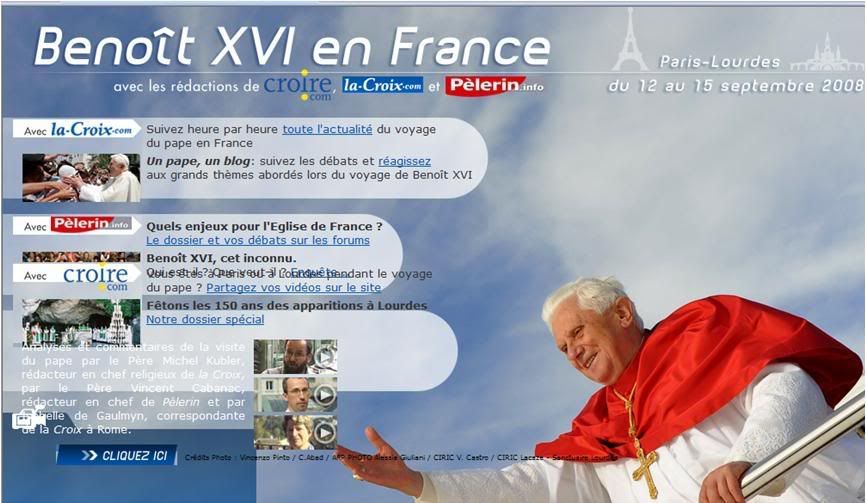 It even includes a group blog - similar to what the New York Times had during the Pope's visit to the USA, but with three timesas many bloggers who already have had a lot to say....
It even includes a group blog - similar to what the New York Times had during the Pope's visit to the USA, but with three timesas many bloggers who already have had a lot to say....
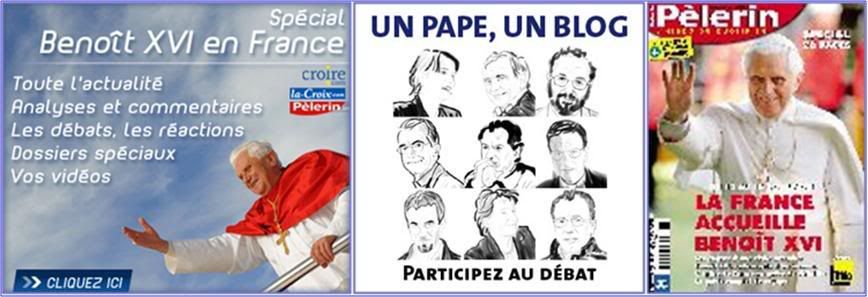 LA CROIX (The Cross) is a daily newspaper and PELERIN (Pilgrim) a weekly magazine. Although both were founded by the Assumptionist Fathers in the late 19th century (La Croix in 1880 and Pelerin in 1873) and still Roman Catholic in orientation, they are general interest publications.
LA CROIX (The Cross) is a daily newspaper and PELERIN (Pilgrim) a weekly magazine. Although both were founded by the Assumptionist Fathers in the late 19th century (La Croix in 1880 and Pelerin in 1873) and still Roman Catholic in orientation, they are general interest publications.
I must say that if one were to judge from the Croix-Pelerin coverage, one would never suspect Catholicism in France was in peril.
Vatican Radio's Italian service also has a very good dossier on the Pope's trip to France,
www.radiovaticana.org/it1/Lourdes_2008/sommario.asp
with much background information. Unfortunately, the English service does not have anything similar.
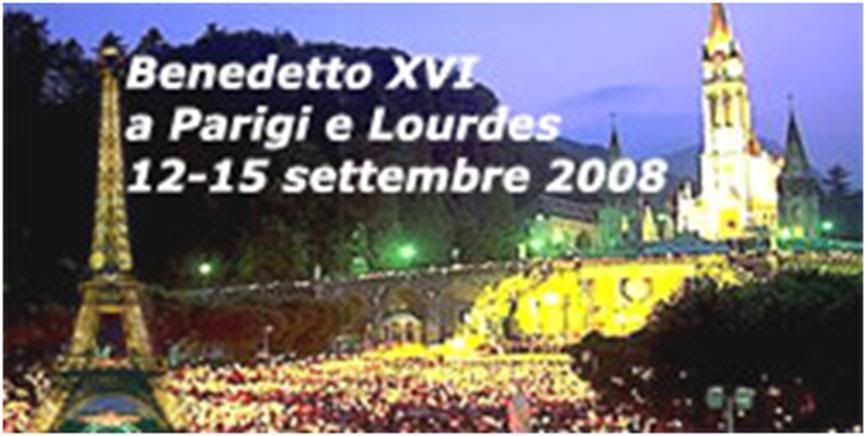
[Modificato da TERESA BENEDETTA 11/09/2008 05:23] |
 11/09/2008 07:43 11/09/2008 07:43 |
|
| | | OFFLINE | | Post: 14.956 | Registrato il: 28/08/2005
| Utente Gold | |
|
 What will Benedict XVI
What will Benedict XVI
tell the French people?
by Samuel Lieven
Translated from

Sept. 1, 2008
Awaited in Paris and Lourdes for his first visit to France as Pope, from Sept. 12-15, Benedict XVI is not coming only to meet believers, but will be speaking to all Frenchmen. As a man of dialog who never renounces the demands of truth.
"Benedict XVI is coming as head of state," says the Elysee presidential palace.
"The Pope is coming primarily as a pilgrim," they say in Lourdes.
Paris is a political 'stopover' that cannot be avoided for a Pope's first visit to France, and Lourdes, the Marian city, has been in a fever of celebration for the 150th anniversary of the apparitions.
Benedict XVI is making two visits in one, and in multiple functions - alternately, head of state, pastor, pilgrim, man of culture and dialog, he will be meeting young people and the sick, but also bishops, personalities of the political, cultural and artistic world....
To be welcomed first of all at the Elysee, will the Pope refer to the address made by President Sarkozy last December at the Lateran in Rome?
One recalls that having invited Catholics and believers of other faiths to declare their beliefs, but above all by comparing the role of a public servant to that of a parish priest, the President unleashed angry replies from secularist circles.
Doubtless concerned about keeping a hard-won equilibrium - in France, no one disputes the 1905 secularity law with impunity - the bishops of France and the church movements received Sarkozy's remarks about 'positive secularity' with muffled enthusiasm.
Will the Pope have something to say about this that could ease tensions in public opinion?
"Sarkozy's address shares the sense of what most modern Popes have written on the political and social dimension of Christian engagement," observes philosopher Thibaud Collin. [ Benoît XVI, le moment, Ed. Fayard, 2008]
Wanting to start a dialog with all of society, Benedict XVI is not one, however, to content himself with the least common denominator.
"As a theologian, he is very likely to put the stress on a permanent search for truth and justice," says Collin. "He will use demanding language which, on issues like respect for life from conception to its natural end, will recall that of John Paul II, who was often criticized in France for the severity of his moral teachings.
But though he may be a head of state under international law, Benedict XVI is, above all, a pastor, in the eyes of believers. In this capacity, the Pope has given the youth of France a choice spot in his program - in Paris, a meeting in front of Notre Dame, and at Invalides as at Lourdes later, the Masses will be dedicated, among other things, for young people.
Church authorities expect a warm encounter.
"The visit of a Pope is a moment when the church that has been 'dormant' in the hearts of young people manifests itself spontaneously," observes Fr. Jacques Gagey, Chaplain-General of the Scouts and Guides of France, which has 60,000 members.
Will Benedict XVI find the words to address the young people of France, 40% of whom claim today to profess no religion at all?
"The Pope can clarify for them the contents of the faith," says Mons. Benoit Riviere, Bishop of Autun and official in charge of the youth ministry of the bishops of France. "As a catechist, he will explain to them that the act of believing is not simply a cry of the heart but also requires the support of reason."
A pedagogue of faith, Benedict XVI has also made ecological responsibility one of his leading themes. His thoughts on this subject may find a favorable echo well beyond the circle of believers, since protection of the environment is one of the concerns dear to the younger generations.
And then, there's Benedict the pilgrim to Lourdes.
"As soon as he gets off the helicopter [that will bring him from Tarbes airport to Lourdes itself], the Pope will proceed to follow the first three stages of the Jubilee Way," says Jean-François Monnory, secretary-general of the Lourdes shrines.
After his visits to Altoetting in Germany, Aparecida in Brazil and Mariazell in Austria, Benedict XVI will add another shrine to his 'world tour' of the great Marian shrines. [The Pope also visited the Virgin of Czestochowa in Poland, the House of Mary in Ephesus (Turkey), and the Cathedral of Our Lady of the Abandoned (Nuestra Senora de los Desamparados) in Valencia (Spain). In Italy, he has been to the Our Lady of Divine Love (Divino Amore) shrine outside Rome, the Holy House in Loreto, Our Lady of Mercy in Savona, Our Lady of the Guard in Genoa, Our Lady at land's End (De Finibus Terrae) in Leuca, and only last Sunday, Our Lady of Bonaria in Cagliari.]
But Lourdes is also and above all the place where every year, more than 80,000 sick and handicapped people converge. Among them, a dozen representatives will receive the sacrament of unction for the sick from the Pope at the Basilica of Our Lady of the Rosary. A gesture which is expected to raise some contrary views.
"to reaffirm, in the name of the Gospel, the central place which belongs to the weakest members of society is to question the foundation itself of our society: are we simply concerned about the cult of performance and success, or should we also encourage attention to the needy?" asks Erik Pillet, president of the Arche en France, which provides care to more than a thousand mentally handicapped people in France.
Finally, there's the man of culture. Will Joseph Ratzinger's legendary mental agility hit the spot before the hundreds of intellectuals, artists and opinion makers he will be addressing at the College des Bernardins?
The challenge is clear, but to make himself heard in a nation with a strong secularist tradition, should Benedict XVI water his wine?
"Unlike John Paul II, who accused Western philosophy of excluding God from its thinking, Benedict XVI sees in this heritage a beneficial test for the faith," [Huh????] says historian Philippe Levillain. "This spiritual disposition should allow him to find just the right pitch for his audience at Bernardins."
Mons. Maurice de Germiny, Bishop of Blois and president of the Faith and Culture observatory, is expecting a definitive gesture from the Pope with regard to artists. "The Church should not be indifferent to what musicians, painters or sculptors think: we should be within the crossroads of what is aid and lived in society."
In sum, will Benedict XVI be - in his own way and his own style - be the Pope of openness that France is hoping for? Will he be able, speaking to them in their own language, to touch the hearts of the French?
One knows that since he became Pope, he has, more than ever, been labelled as a tenacious 'conservative'. The Regensburg lecture of 2006 which provoked violent demonstrations in the Muslim world and his decision to liberalize the traditional Mass in Latin, hardly helped him with his critics.
And yet, Benedict XVI has also shown his ability to clear up misunderstandings - without having to renounce the message of which is the primary bearer.
|
 11/09/2008 13:23 11/09/2008 13:23 |
|
| | | OFFLINE | | Post: 85 | Registrato il: 16/07/2007
| Utente Junior | |
|
"The Pope can clarify for them the contents of the faith," says Mons. Benoit Riviere, Bishop of Autun and official in charge
of the youth ministry of the bishops of France. "As a catechist, he will explain to them that the act of believing is not
simply a cry of the heart but also requires the support of reason."
This statement is rich! The contents of the faith also need a culture that is conducive to their enrichment. It's not enough
to have an emotional urge for faith or to couple it with reason. If the surrounding culture is arid, faith simply won't grow.
And that's what's happened in France (not to mention America. For all the talk about how "religious" America is, many "Catholics"
have bought into the secular culture as have the majority of evangelicals).
I must say the one part of the Pope's discussion that I find a bit tenuous is his description of a "healthy secularity." I know
that he means a benevolent government, which creates a space for all faiths to practice, but, at least in America,
the experience has been that this benevolent government is Protestant and its founding principles are Protestant and the public
space is Protestant. Catholics have to fit in wherever they can, but the public discussion is always predicated on Protestant
principles so Catholicism really never gets anywhere.
I would be in favor of founding a Catholic party if the resulting, predictable outcry wouldn't be so deafening.
* * * * * * * * * * * * * * * * * * * * * * * * * * * * * * * * * * * * * * * * * * * * * * * * * * * * * * * * *
Janice- I hope you don't mind that I adjusted the line length on your post to avoid the skew effect of long lines (beyond 9 inches wide
on the message box) on the whole page.
TERESA
[Modificato da TERESA BENEDETTA 11/09/2008 14:10] |
 11/09/2008 13:26 11/09/2008 13:26 |
|
| | | OFFLINE | | Post: 14.958 | Registrato il: 28/08/2005
| Utente Gold | |
|

OR today.
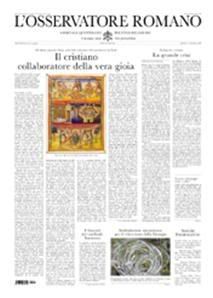 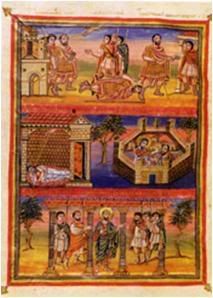
At the General Audience, the Holy Father speaks of Paul's idea of Apostolate:
'The Christian as a collaborator for true joy'
Illustration: Scenes from the Life of St. Paul, 9th-century miniature.
Also, the Pope's message for France on the eve of his visit; and his eulogy for the late Cardinal Innocenti.
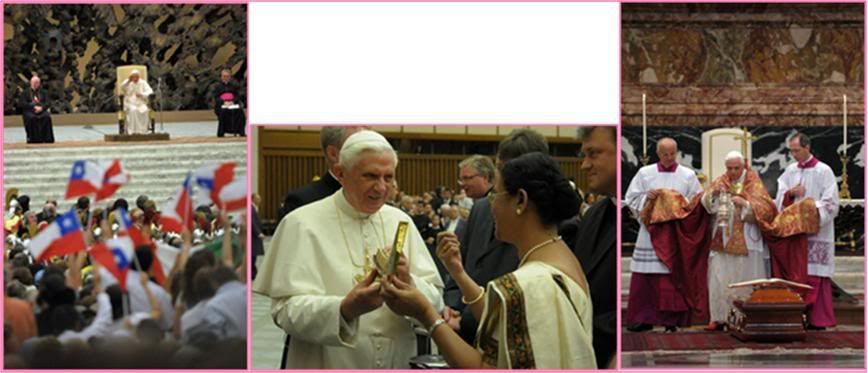
Other Page 1 stories: An editorial commentary on demographics and development points out that the current economic crisis in the West is related to
the decline in Europe's population growth from 7% per annum to zero in the past 30 years; crude oil goes down below $100 a barrel for the first time
in months but rises a bit when OPEC announces it is cutting down daily production.... In the inside pages, a commentary on the seventh anniversary of
9/11, and a mini-special (5 articles) on St. Michael the Archangel, who is venerated in Italy in three mountaintop shrines dating to the Middle Ages.
THE POPE'S DAY
The Holy Father met today with
- H.E. Lars Petter Forberg, Ambassador from Norway, on a farewell visit;
- Bishops of Paraguay (Group 3) on ad-limina visit.
The Pope leaves Rome at 9 a.m. tomorrow to begin his 4-day visit to Paris.
|
 11/09/2008 13:45 11/09/2008 13:45 |
|
| | | OFFLINE | | Post: 14.958 | Registrato il: 28/08/2005
| Utente Gold | |
|

 Test image on one of several maxi-screens the Archdiocese of Paris has set up around the Papal
Test image on one of several maxi-screens the Archdiocese of Paris has set up around the Papal
event sites, this one near Notre Dame Cathedral.
as church flock dwindles
by Carole Landry

PARIS, Sept. 11 (AFP) - Facing a freefall in the number of churchgoers despite its deep Christian heritage, France is set to welcome Pope Benedict XVI on his first visit to bond with the Catholic church's "eldest daughter."
The German Pope arrives in Paris on Friday for talks with President Nicolas Sarkozy and to deliver a keynote address before flying to the southwest town of Lourdes, one of the world's most visited Catholic sites.
France is home to an estimated 35 million baptised Catholics, although polls show the French have lost much of their sense of belonging to the church over recent decades.
While Catholicism remains by far the country's number one religion, 51 percent of the French consider themselves Catholic, down from 80 percent in the early 1990s, according to a survey published last year.
Of those, only 10 percent attend mass regularly, the survey in Le Monde des Religions magazine showed.
Known as the Catholic church's "eldest daughter" since Frankish king Clovis converted in the fifth century, France is shaping up as a testing ground for the Catholic church's revival in Europe.
"Statistically, the church is in the red," commented Michel Kubler, the editor in chief for religious issues for the Catholic newspaper La Croix.
"All the indicators are down, from church attendance to baptisms to the number of priests."
France last year overtook Ireland as Europe's fertility champion, with women giving birth on average to two children, but a majority of babies are now being born out of wedlock.
Church weddings are losing favour among the French, with priests officiating some 89,000 ceremonies in 2006, compared to 147,000 in 1990, according to church statistics.
But what French Catholics have lost in numbers, they appear to be making up in enthusiasm, according to Kubler, who said followers nowadays feel less bound by tradition and more anchored in faith.
"French Catholics are a lot less passive. There are signs of a significant renewal," he said.
The Catholic church has been vocal on immigration, the rights of undocumented workers, euthanasia and bioethics - all of which are hot-button issues in France.
Home to large Muslim and Jewish communities, France is also a staunch defender of secularism under a keystone 1905 law that enshrines the separation of state and church.
But Sarkozy, a twice-divorced lapsed Catholic, broke a taboo when he declared during his Vatican visit in December that upholding France's Christian roots was not in contradiction with secularism.
Benedict's visit to France will be closely watched for any pronouncements on the role that French Catholics should play in the country's drive to reform and as it grapples with secularism.
French cardinal Jean-Louis Tauran said the papal visit would be an opportunity to "set the record straight" on secularism, with the Church seeking to ease the hardline view that religion has no place in public life.
"The state today must take into account that despite advances in secularism, many citizens have a spiritual life that resonates in social life," said Vatican state secretary Tarcisio Bertone this week.
"It is neither fair nor productive to build the common good without any consideration for what is, from the point of view of common sense, a reality in society."
The Pope's four-day visit to France will be his 10th foreign trip since his election in 2005 following the death of John Paul II, who twice visited Lourdes, a town of 15,000 people in the foothills of the Pyrenees near the Spanish border.
In Lourdes, Benedict will commemorate the 150th anniversary of the Vatican-recognized apparitions of the Virgin Mary to peasant girl Bernadette Soubirous.
More than 200,000 people are expected to descend on the town where Benedict will take part in a torchlight procession to the grotto where Bernadette is said to have seen Mary 18 times over a period of a few months in 1858.
The Pope wraps up his trip Monday with a Mass for the sick in Lourdes that the Vatican has portrayed as an opportunity for Benedict to shed his reputation as a cold theologian and show his compassionate side.
 Since AFP (Agence France-Presse) is one of the world's top international news agencies, what it writes about the Pope's visit to France will tend to be reported extensively by worldwide media. For a pre-visit piece, this one is mostly rote and pretty 'blah', saying nothing new except Michel Kubler's comment that there appears to be a significant renewal among French Catholics.
Since AFP (Agence France-Presse) is one of the world's top international news agencies, what it writes about the Pope's visit to France will tend to be reported extensively by worldwide media. For a pre-visit piece, this one is mostly rote and pretty 'blah', saying nothing new except Michel Kubler's comment that there appears to be a significant renewal among French Catholics.
Well, par for the perfunctory journalist, really, who mostly operates 0n (deficiently programmed) autopilot. But what I really find stupid and offensive is the last sentence (hopefully, it will get cut off as tailends of stories usually are because of space considerations in newspapers) - one would think Pope Benedict had
never before 'shown his compassionate side', and I doubt that anyone in the Vatican 'portrayed' the Mass for the sick in Lourdes as this reporter makes it out!
 Workmen prepare the altar stage for the Papal Mass on Saturday at the Esplanade of the Invalides; right photo shows choir members rehearsing at St. Sulpice.
Here is an earlier, more general pre-visit story from AFP:
Pope heads to France Friday
Workmen prepare the altar stage for the Papal Mass on Saturday at the Esplanade of the Invalides; right photo shows choir members rehearsing at St. Sulpice.
Here is an earlier, more general pre-visit story from AFP:
Pope heads to France Friday

VATICAN CITY, Sept. 10 (AFP) -- Pope Benedict XVI will embark on his 10th foreign trip outside Italy since his election three years ago when he heads to France on Friday.
In his travels so far, the 81-year-old Pontiff has been twice to his native Germany, as well as Poland, Spain, Turkey, Brazil, Austria, the United States and Australia.
The Pontiff will travel first to Paris on Friday before heading to Lourdes, southwestern France, on Saturday to mark the 150th anniversary of a peasant girl's claimed visions of the Virgin Mary in the Pyrenees town that has become the most important Marian sanctuary in the world.
Benedict travels far less than his predecessor John Paul II, who visited 129 countries in his nearly 27 years as Pontiff.
The Pope's latest destination was Australia, where he attended the World Youth Day festivities in Sydney.
As he did during his April trip to the United States, the Pope publicly expressed his "shame" over the "evils" of pedophile priests.
In the United States, the Pontiff made stops in Washington and New York including a speech to the UN General Assembly.
Benedict visited Turkey in late 2006 at the invitation of the Ecumenical Patriarch Bartholomew I, but the trip is best remembered for his stunning gesture to the Muslim world just months after his remarks seemingly linking Islam to violence sparked riots.
He assumed an attitude of Muslim prayer alongside the grand mufti of Istanbul Mustafa Cagrici, facing Mecca, in Istanbul's Blue Mosque.
 Meanwhile, AP is already looking forward to Lourdes:
Pope to visit Lourdes as pilgrim
Meanwhile, AP is already looking forward to Lourdes:
Pope to visit Lourdes as pilgrim
By FRANCES D'EMILIO

VATICAN CITY, Sept. 11 (AP) - Pope Benedict XVI will visit the Lourdes shrine in southern France this week, following the same path many have taken hoping for miracles.
Benedict will be a pilgrim and what he calls a "messenger" of peace in his first trip to France as pontiff, a four-day sojourn that begins Friday in Paris.
His stay in the French capital will coincide with the second anniversary of his speech about Islam that strained Vatican relations with much of the Muslim world.
The rector of the Paris Mosque, Dalil Boubakeur, who is among the Muslim leaders invited to hear the pope speak Friday evening, said Benedict's 2006 Regensburg lecture to theologians in Germany surprised him, coming from a man who is so "deep and discreet."
In that speech, Benedict quoted a 14-century Byzantine emperor who was explaining why spreading faith through violence is unreasonable.
The pope has said he is sorry for any offense his Regensburg remarks caused and Boubakeur said that was "ancient history."
"Through his speeches we know that he is a man of peace and dialogue," Boubakeur said.
Benedict will meet separately with leaders of France's Jewish community.
France has witnessed a surge in anti-Semitic crime starting in 2000 amid a flare-up of Israeli-Palestinian tensions.
While France is traditionally Roman Catholic, it has Western Europe's largest population of both Jews and Muslims.
Benedict told French pilgrims at his audience Wednesday in St. Peter's Square that he was coming to their country as "a messenger of peace and brotherhood."
The trip grew out of his desire to visit the Lourdes shrine in southern France near the Pyrenees while the sanctuary celebrates the 150th anniversary of apparitions of the Virgin Mary to a local 14-year-old, Bernadette Soubirous.
The shrine draws 6 million people annually, some of them disabled or desperately sick, many of them hoping for a miracle.
The Catholic Church has recognized as miraculous 66 healings linked to Lourdes from 1858 to today.
Lourdes was the last trip abroad for Benedict's predecessor, John Paul II. When John Paul visited in 2004, he was 84 and suffering the final ravages of Parkinson's disease. He needed to be helped by aides. He died in 2005.
 And Reuters takes a closer look at the Lourdes phenomenon.
No new Lourdes miracles
And Reuters takes a closer look at the Lourdes phenomenon.
No new Lourdes miracles
despite eased criteria
By Tom Heneghan

PARIS, Sept. 11 (Reuters) - When Bishop Jacques Perrier said the Roman Catholic Church would ease some criteria for miracles, skeptics foresaw a wave of pious believers claiming they had been healed at the famous shrine in his diocese of Lourdes.
New categories were needed, Perrier argued, because medical progress in recent decades had made it all but impossible to meet the strict scientific criteria for certifying miracles at the pilgrimage site in southwestern France.
Perrier proposed the new categories -- declared, unexpected and confirmed healings -- to allow the Church to officially honor the pilgrim's recovery and the spiritual experience that went with it, even if it cannot be called miraculous.
Now, two years later and just before a visit to Lourdes this weekend by Pope Benedict, the bishop told Reuters there had been anything but a rush of healings. In fact, not a single new case of stunning recovery from serious illness has been established.
"This is a very difficult idea to get across because it is a graduated system," Perrier said by telephone from Lourdes when asked about the reform that skeptics have dubbed "miracle lite."
"A binary message -- that something is black or white, yes or no -- is easy," he said. "But it will take at least 10 years to get people used to this idea."
Of the six million pilgrims who visit Lourdes each year, about 40 claim they have been miraculously healed there. But doctors usually end up telling them their recoveries were not totally inexplicable.
There are at least four cases being examined now that could be declared healings if they are not recognized as full miracles, he said. But that could still take several years.
The Lourdes story goes back to 1858, when the peasant girl Bernadette Soubirous reported seeing the Virgin Mary and being told to dig at a grotto for water. Soon, Catholics visiting the spot claimed their illnesses were healed by the water.
The Church set up a medical bureau to verify the claims. Among other criteria, the healing had to be inexplicable by science and could not be late effects of earlier treatments. A total of 67 healings have been declared miraculous so far.
Those criteria were not unsurmountable hurdles a century ago, when many diseases were incurable and many now routine treatments were unknown. But modern medicine has made the miracles Lourdes is famous for ever rarer.
Between 1907 and 1913, 33 healings were declared miraculous. Another 22 were declared between 1946 and 1965. But there have only been five declared miracles since then, the last in 2005.
Perrier denied trying to boost the Lourdes miracle total.
"The Church didn't push the doctors to find miracles," he said. "They said some healings were really remarkable and we should take them seriously."
Even if the Lourdes doctors classify a recovery as unexpected, it is up to the bishop in the patient's home diocese to issue the official confirmation.
"I have to try to convince a patient's bishop to do it," Perrier said. "Some are more disposed to this than others."
To mark the 150th anniversary of the apparitions of Mary at Lourdes, Perrier has just published a book in which he recounts how the shrine developed in a polemical climate as science was aggressively challenging the Church and its teachings.
"In the 19th century, the healings at Lourdes were able -- and maybe that was their mission -- to show medical science it still had a long way to go, and that human reality was much more complex than some simplistic explanations," he wrote.
The new criteria shift the focus from scientific inquiry -- can doctors explain it or not? -- to a religious appreciation of the spiritual experience linked to an improbable healing.
"The legitimacy of Lourdes doesn't need miracles," he wrote. "Certified miracles are now very rare, but the number of pilgrims visiting Lourdes keeps on rising."
Does anyone know whether Cardinal Ratzinger ever visited Lourdes?
[Modificato da TERESA BENEDETTA 12/09/2008 01:05] |
 11/09/2008 15:49 11/09/2008 15:49 |
|
| | | OFFLINE | | Post: 14.960 | Registrato il: 28/08/2005
| Utente Gold | |
|
 Cardinal Bertone:
Cardinal Bertone:
"It's time to translate
'positive secularity' to action"

Sept. 10, 2008
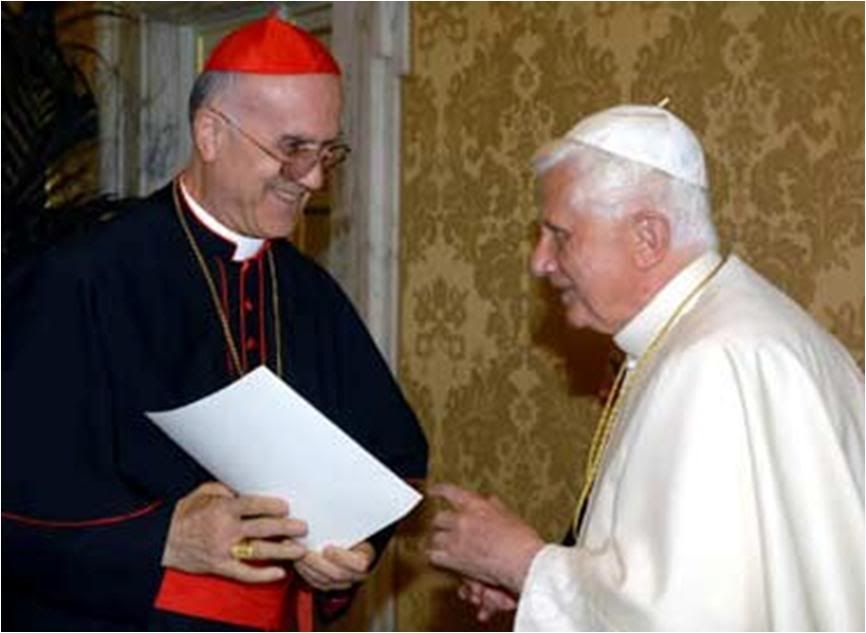
On the eve of Benedict XVI's trip to France, La Croix and Pelerin interviewed Vatican Secretary of State, Cardinal Tarcisio Bertone, who spoke about his views on how Catholics should engage themselves in society.
Can you tell us what your own personal links are to France?
I appreciate French culture a great deal. French was the first foreign language I studied. As a schoolboy and in the university, I read the great French authors like Paul Claudel, François Mauriac, Maurice Nédoncelle, and of course, because of my courses in social and international morality, I particularly studied the works of Jacques Maritain and Rene Coste.
What are the priority challenges that French Catholics should face?
The Church in France, being deeply rooted in society, and for missionary and intellectual reasons, has always meant to be a presence
on the whole ensemble of social questions and in places where men live and work - with special attention now to bioethical issues, education and the family, life in the suburbs, the reception and integration of immigrants, the culture of the land...
So the Church in France must remain faithful to this tradition by continuing to embrace within its purview and its commitment the totality of human realities. The history of the Church in your country in this respect is full of very different faces of saintliness, which attest to its permanent openness to the challenges of the world as well as the great social fruitfulness of the Gospel.
The question of secularity has raised fresh debates, particularly since the first centenary of the French law on the separation of Church and State, and then, with the statements made by President Sarkozy in Rome last December. How do you view this debate?
The French concept of secularity has tended to marginalize the faith, restricting it to the private domain. On its part, the Church in France - which has habitually been in dialog with other religious confessions and other schools of thought in French society - has tried to make it clear that it does not speak nor act like a political lobby that seeks to promote its interests, but that by expressing itself on social issues, it wishes to contribute to the common good.
Happily, both these elements have evolved quite a bit during the past 10 years. President Sarkozy's Lateran speech was a measure of this evolution, when he spoke of a 'positive' secularity which acknowledges the importance and value of religions in lay society.
How should the situation further evolve, in your opinion?
Today, the state has been led to take into account the fact that, despite the advance of secularization, many citizens have a 'spiritual life' which resonates in social life, and that it is neither right nor fruitful to try and build the common good by keeping out of the mix what is - when seen with the eyes of common sense - a social reality.
If words mean anything, positive secularity does not constitute a threat for the principle of secularity, much less a break. It simply means that such a secularity is not blind and does not misconstrue the fact of religion. It is an evolution that makes secularity more healthy. But now it is necessary that this idea of secularity be put into action.
French society is increasingly marked by religious pluralism. How should the Church deal with this new context?
In the first place, I must point out that Christian life is determined above all by Christ rather than by the historical or social context of the Church. And I gladly repeat the words recently expressed by Cardinal Jean-Louis Tauran, president of the Pontifical Council for Inter-Religious Dialog (CIRD): "We should never be afraid in the least to express and live our faith."
Inter-religious dialog is neither a contradiction nor a substitute for witnessing one's faith. The dialog among the major religions, whose profound logic is charity, is not intended to erase all differences among believers. It has a different motivation: to discover, through reciprocal assistance, the truth about God, about man and his mysterious destiny.
Knowing about the strong efforts towards productive inter-religious dialog, and at the same time, the desire by many Christians to be involved in such a dialog, I can say that the CIRD is preparing a document that can help and stimulate participants in such a dialog.
Benedict XVI is making this pastoral visit to France on the occasion of the 150th anniversary of the Virgin's apparitions to Bernadette. What can such an event - and such a place - mean in the life of believers?
Through the life of St. Bernadette, we discover how the most extraordinary events - receiving the grace of becoming a 'confidante' of the Virgin Mary - can enter a most ordinary human life. Thanks to her, we can grasp concretely how man's alliance with God does not make us abandon the history of men and does not free us from feeling all the weight of the human condition, but cam transfigure it with humility and love.
Because of my Salesian formation, I live intensely my devotion to the Virgin, and I am very much attached to Lourdes, which is a profound feature of French Catholicism.
In Lourdes, the Church of France sustains a singular filial bond to Mary, as we can see with the impressive and growing number of visitors to the Shrine and the great annual pilgrimages there on the diocesan, national and international levels.
The Church continues to be very attentive to what happens in Lourdes, and it pays particular attention to children - favored confidants of the secrets of the Kingdom. And it gets from Lourdes the courage not to allow it to be put off or weakened by sociological conditions.
Finally, what image do you have of the Church in France?
I think it remains profoundly habituated to the virtue of hope. It has learned from the Virgin Mary that 'nothing is impossible to God'. And those are the traits shown by the Christian communities of France - who live in a prosperous and rather highly secularized country - and who in this way render their particular witness to faith within the universal Church.

The Vatican has released the 192-page Missal for the Pope's liturgical events in France in PDF format
www.vatican.va/holy_father/benedict_xvi/travels/2008/documents/messale_Fra...
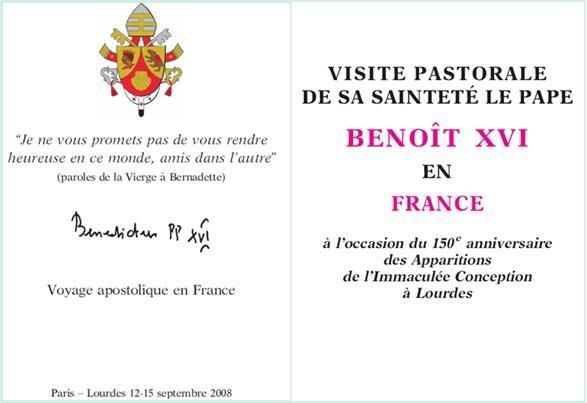 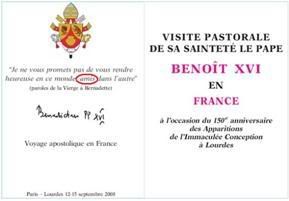 But Mons. Guido's 'eye for detail' failed him here - because there is an unfortunate typographical error on the cover page itself (see smaller panel) -
But Mons. Guido's 'eye for detail' failed him here - because there is an unfortunate typographical error on the cover page itself (see smaller panel) -
where the word 'amis' (friends) in the quotation of the Virgin's words to Bernadette should be 'mais'(but)... The citation is: "I do not promise to make
you happy in this world but in the next."
 Le Figaro has its own interview with Cardinal Bertone, published today.
'We cannot resign ourselves
Le Figaro has its own interview with Cardinal Bertone, published today.
'We cannot resign ourselves
to the shortage of priests',
says Cardinal Bertone
Interview by Jean-Marie Guénois
Translated from

Sept. 11, 2008
The Secretary of State of the Holy See, Cardinal Tarcisio Bertone, is the Pope's 'prime minister'. Benedict XVI depends largely on the Secretariat of State for the government of the Church. The cardinal analyzes for Le Figaro what is at play in the Pope's visit to France.
Benedict XVI is coming to France for the first time as Pope. Is this trip different for him?
The Pope's visit to any nation is part of his mission as Pastor of the universal Church, handed down from the Apostle Peter: to pasture the flocks of Christ and confirm his brothers in the faith.
In the case of France, no one can ignore its historical tradition nor the role that the Catholic Church has played in the course of centuries, in different ways.
To answer your question, I would highlight the second part of the trip. Like millions of other pilgrims, the Pope will be in Lourdes to mark the 150th anniversary of the apparitions of the Virgin Mary to St. Bernadette Soubirous.
The whole world knows the shrine of Lourdes and its message which is about prayer and the sick. But the Pope will also be meeting there with the bishops of France. It will be a moment of communion - an opportunity for him to show his affection for the pastors of the French dioceses and to exhort them in their sensitive mission to lead the faithful entrusted to their care.
In fact, the statistics are quite disquieting for the Church. What ways out do you see?
That of consistency in the faith and apostolic courage - without fear, neither of the present situation nor of the future. It was what the Pope exhorted at the start of his Pontificate: "Do not be afraid of Christ. He takes nothing away and gives everything."
If I had to choose a priority, then I think the greatest consideration must be given to the problem of priestly vocations. We cannot be resigned to the decline in the number of priests, because a parish without a pastor is like a family that has lost its father.
We must pray, and 'roll up our sleeves' to sensitize our families and communities to generate and cultivate vocations for the priesthood. God continues to call those who should make his presence felt in the communities - the response should be more generous.
How does the Pope see the Church of France? As an 'enfant terrible', refractory?
I think back to the question John Paul II posed in his homily at Le Bourget in June 1980: "France, eldest daughter of the Church, have you been faithful to your baptismal vows?"
I am sure that even today, there are in France - in the cities as in the countryside, in the parishes and in the monasteries, in the movements of Catholic apostolate as well as in the large families [for decades, France has had a program of government incentives for families who have more than three children] - many faithful who live their faith seriously and give witness of it.
I think there still is a profound religious sentiment, still quite widespread, which needs to be encouraged, and which every person who is baptized should learn to adopt.
I would point to the fact that at the recent World Youth Day in Sydney, the Church of France sent thousands of fervent young people who were enthusiastic witnesses of Christ. In this sense, the activity of the bishops, priests, and religious is invaluable. They should be open to the ecclesial richness that can come to them from outside and contribute to renew many communities and structures that have 'aged', if I may be allowed to use the term.
Benedict XVI arrives in a political climate where the debate on secularity has been revived following the Lateran address of President Sarkozy in Rome. Is he going to reply to that?
The President of France gave an address whose novelty was extensively remarked on. It was a well-appreciated speech because the head of state had the courage to publicly declare his idea of a secularity which he defined as 'positive' - which is to say, without hostility nor a desire to ignore religion and its role in society and the world. The Pope's meeting with the President will certainly be an occasion to revisit the issue.
He will also meet the world of French culture at the College des Bernardins. How does he intend to overcome the mistrust of certain French intellectual circles?
The theme of dialog between faith and reason is very dear to Pope Benedict XVI, as it was when he was a professor and a cardinal. It is something he knows very well and which he does not stop exploring.
Any intellectual - not just Catholic intellectuals - who reflects on this theme cannot ignore the voice of the Church. But I do not think that there is an attitude of 'mistrust' in France towards Benedict XVI's thinking.
The address he will give at the Bernardins will be an occasion to revisit this theme, to inspire curiosity, interest and even the desire to look deeply into the bonds of faith and reason, religion and culture, and their complementarity.
Last year, the Holy See issued a Motu Proprio [As a Motu Proprio is, by definition, a personal intervention by the Pope, it is properly issued by the Pope himself, not by the Vatican!] to try and resolve a liturgical problem that is largely a French problem. Did this move not cause a chill [in relations with the Church of France]?
Allow me to make a correction: one cannot say the liturgical problem was largely French. The Pope made his decision with a view towards the good of the entire Church.
It is true one expected more from France because, as everyone knows, it is where Mons. Lefebvre's movement was born, and the fraternity founded by him has extended throughout a great part of France.
One cannot deny, on the other hand, that even among the bishops of France, there have been opposing views. But it must be acknowledged that the bishops of France accepted the Pope's document and, on the whole, they have done what they can to apply it.
I must add that one must understand well the intention that motivated the Pope's decision: the celebration of the Eucharist should favor the unity of the Church, not its division. To think otherwise is to stray far from the intentions of the Universal Pastor of the Church. [It's rather disingenuous to omit the magisterial character of the Motu Proprio in terms of 'lex orandi', considering that the Motu Proprio was also clear that normalizing the traditional liturgy was necessary to underline the continuity of Church tradition.]
You know Benedict XVI quite well since you worked with him at the CDF and now as his Secretary of State. How would you characterize his Pontificate?
His example and his teachings are a constant lesson of life!
I wish, first of all, to underline the clarity of Benedict XVI's teaching, which is always expressed with a nobility of language that has at the same time a great capacity to persuade.
As Prefect of the CDF, Cardinal Ratzinger liked to say that his role was to defend the faith of the simple folk against ambiguous and erroneous teachings by those who claim to be the savants of the world.
In him, the gifts of nature and of grace compenetrate, and are further enhanced by his humility and simplicity.
As his Secretary of State, I can attest to the way that he carries the weight that God has placed on his shoulders, a weight that surpasses human strength - that of leading the flock of Christ as its Universal Pastor.
I think the fundamental lines of his Pontificate have emerged: a clear and convincing Magisterium, both on the theological and moral planes; the impulse given to ecumenism and the conduct of inter-religious dialog, seeking to overcome difficulties little by little; the concern for the weakest and poorest elements of society; the concern for those who are undergoing the most severe difficulties, with constant and vigorous appeals for peace, for reconciliation among groups and peoples, and for universal solidarity.
[Modificato da TERESA BENEDETTA 11/09/2008 21:37] |
 11/09/2008 16:14 11/09/2008 16:14 |
|
| | | OFFLINE | | Post: 86 | Registrato il: 16/07/2007
| Utente Junior | |
|
Sorry to go on about secularism, but really if French (or American) Catholics really want to live in places where they can express their faith, they will have to live in enclaves (what Fr. John Tracy Ellis referred to as "ghettoes") where they can do so. It's not enough to express one's faith in a desert, where the only places are the home and Mass on Sunday. The society itself has to be enlivened by faith also. Now that used to be all of France and America had the old, ethnic neighborhoods. That wasn't to say that there weren't those of other faiths or no faith around, because there were, but your own faith accompanied you everywhere you went. Just look at Millet's "The Angelus." I find Cardinal Bertone's response very unsatisfying. |
 11/09/2008 16:16 11/09/2008 16:16 |
|
| | | OFFLINE | | Post: 87 | Registrato il: 16/07/2007
| Utente Junior | |
|
And, by the way, the World Youth Day that was held in Paris, drew millions. And the result? With no help from the larger society: nothing. |
 11/09/2008 16:54 11/09/2008 16:54 |
|
| | | OFFLINE | | Post: 14.961 | Registrato il: 28/08/2005
| Utente Gold | |
|
 'The Pope of quiet surprises':
'The Pope of quiet surprises':
An interview with George Weigel
By Karna Swanson

PARIS, SEPT. 10, 2008 (Zenit.org).- As France is getting ready for Benedict XVI's arrival here this weekend, American author and Catholic theologian George Weigel finds himself to be part of the preparations.
The Pope will visit Paris and Lourdes this weekend, and French editing house Mame-Edifa-Magnificat has released - just in time for the occasion - the translation of Weigels' book God's Choice: Pope Benedict XVI and the Future of the Catholic Church.
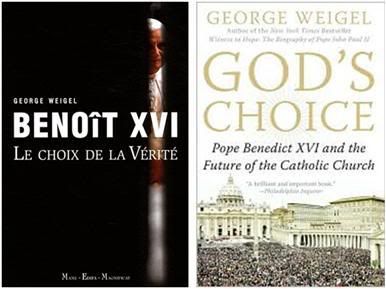 Interestingly, the title in French is "The choice of truth'.
Interestingly, the title in French is "The choice of truth'. Weigel, a senior fellow at the Ethics and Public Policy Center, also authored Witness to Hope: The Biography of Pope John Paul II in 1999. In God's Choice, published in 2005, he offers an introduction to Benedict XVI's pontificate.
Weigel told ZENIT that in these three years since Cardinal Joseph Ratzinger became Benedict XVI, he has made some key contributions to the Church: "He has been a master catechist, drawing the Church back to its roots in the Bible and the Fathers who created Christian doctrine.
"He has also done both the world and the Church a great service by highlighting and analyzing the linked problems of faith-detached-from reason -- as in jihadism -- and a loss-of-faith-in-reason -- as in European, and especially French, post-modernism.
"Finally, the Pope has reminded the Church that it is most itself when it is celebrating the Eucharist, which must therefore be done with appropriate dignity."
Commenting on expectations that Benedict XVI will talk about secularism, as he did in the United States in April when he called the United States an "example of healthy secularism," Weigel notes that France is not the United States.
"French secularism - 'laicite' - and American secularity are two very different things," he said. " French 'laicite' was a movement against the Church; the institutional separation of Church and state in the United States was meant to foster the free exercise of religion."
The country, often called the cradle of secularism, boasts the lowest Church attendance rate in all of Europe.
A 2005 study by the Center for the Study on Global Christianity at the Gordon-Conwell Theological Seminary in South Hamilton, Massachusetts, found that Church attendance in some areas of France is as low as 10%.
A 2000 study by the Swedish-based World Values Survey showed that nearly 60% of French people "never" or "practically never" attend church. France had the highest percentage of non-churchgoers among 14 European countries. Britain and the Netherlands followed behind with 55% and 48%, respectively.
A 2006 study by research group CSA in conjunction with Le Monde des Religions that found only 26% of French Catholics (who make up 55% of the population of France) say they’re sure that God exists, and the same number say it’s probable.
"France has been living off the moral patrimony of its Christian past for more than two centuries," said Weigel. "The account is now drawn down, and the bank of moral credit is getting empty."
Regarding the future of the Church in France, Wiegel noted some positive signs: "There is a lot of energy in various renewal movements. France is also home to several major Catholic intellectuals. There are several impressive French bishops."
"But," he continued, "I can't say that I see the signs of vibrant Catholic renewal in France that I see in some there parts of old Europe."
And the Pope's Marian devotion? "I think it's clear from his theological work over the past 45 years that Joseph Ratzinger has a deep devotion to Our Lady and a clear view of her place in the history of salvation. Ratzinger's Bavarian heritage would also predispose him to a serious Marian piety."
The Pope will travel Saturday to Lourdes to participate in the celebrations marking the 150th anniversary of apparitions of Our Lady to Bernadette Soubirous.
The Holy Father said that he will pray "at the feet of Our Lady for the intentions of the whole Church, in particular for the sick, the abandoned, as well as for peace in the world."
Weigel, who has called Benedict XVI the Pope of quiet surprises, added that he believes the world has yet to fully understand this German Pontiff, who still might have a few surprises up his sleeve.
 The blurb on the French translation of Weigel's book translates as follows:
The blurb on the French translation of Weigel's book translates as follows:
When it appeared in France in 2005, Jean-Paul II, Témoin de l'espérance (John Paul II: Witness to Hope) by George Weigel was greeted as a masterpiece. More than 100,000 copies were sold in France and millions around the world.
Now, here is his work on Benedict XVI. It opens with an analysis, which has unusual relevance, of "the Church that John Paul II left behind", and then takes the reader behind the scenes of the Conclave of 2005. Not to disclose petty confidences or false revelations, but to discern in them the signs behind the mystery of God's choice of Joseph Ratzinger.
Weigel then reveals the profound transformation 'from Joseph to Benedict', before setting forth a brilliant presentation on how the Pope's writings respond to the challenges of the future. Weigel presents a true portrait of an extraordinary intellectual who accepted to become 'God's donkey'.
Hmmm... Weigel did not present the transition 'from Joseph to Benedict' as a profound transformation; indeed, he called his 45-page chapter on Joseph Ratzinger's biography "The Making of a New Benedict".... I must say that God's Choice is a book that never stales - I pick it up once in a while to look up something, and I end up being riveted re-reading chunks of it, because the whole subject and narrative are so compelling!
[Modificato da TERESA BENEDETTA 12/09/2008 01:15] |
 11/09/2008 18:19 11/09/2008 18:19 |
|
| | | OFFLINE | | Post: 14.962 | Registrato il: 28/08/2005
| Utente Gold | |
|
 A majority of Frenchmen think
A majority of Frenchmen think
favorably of Benedict XVI
Translated from

Sept. 11, 2008
53% of the French (and 65% of French Catholics) have a favorable opinion of Benedict XVI, according to an exclusive survey conducted by Le Parisien and Aujourd'hui en France, while 25% are unfavorable.
But 22% have no opinion about him, a number greater than one-fifth of those polled, which appears to confirm that the Pope is little known in France.
And who are those who judge him well? More citizens of the right (65%) than of the left (45%); and more among workers and employees (58%) than among professionals (40%).
More than three-fourths (76% of the general sample, 76% of Catholics) consider him 'conservative', a percentage that is similar across all age groups, doubtless as a result of the Pope's decree liberalizing the Mass in Latin.
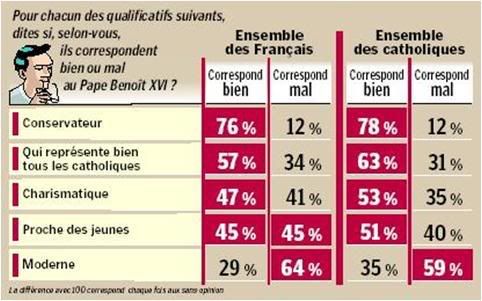
For each of the following characteristics, say whether, in your opinion, they correspond well or badly with Pope Benedict XVI.
The characteristics are ‘Conservative’, ‘represents all Catholics well’, ‘charismatic; ‘Close to young people’, ‘modern’.
The results are grouped into those representing ‘All the French” and “All Catholics’ (in France).
 But who is Benedict XVI?
But who is Benedict XVI?
by Philippe Baverel
Translated from

Sept. 11, 2008
Benedict XVI arrives tomorrow for an event-packed visit to our country. In a period of 72 hours, the Pope will deliver 11 addresses - first in Paris, then in Lourdes, where he will proceed Saturday evening.
In the course of this trip during which the leader of the Catholic Church will address the world of politics (his first meeting is with President Sarkozy at the Elysee), culture (speaking to some 700 intellectuals, artists and opinion makers at the College des Bernardins), and the Church, obviously (with two open-air Masses), the French will discover a man they don't really know.
He does not have the 'rock-star' side of his predecessor. [What exactly is the 'rock-star side'?]
Elected on April 19, 2005, at age 78, "Benedict XVI, who succeeded an overwhelming personality, has not aimed to be another John Paul II. He is Pope in his own way, that of an intellectual", writes Vatican correspondent for La Croix, Isabelle de Gaulmyn, who has just published the book Benoît XVI, le pape incompris (Benedict XVI, the misunderstood Pope)(Bayard).
"Benedict XVI, a former professor, is not a showman [DIM]pt[=DIM][he uses the term 'bateleur d'estrade', juggler on stage]: he is neither the rock star nor the great traveller that his predecessor was," adds Bernard Lecomte, author of the book Benoît XVI, le dernier pape européen(Benedict XVI, the last European Pope)(Perrin).
[Gee thanks, what insights to share! DUH! Does anyone have anything original and non-obvious to say?]
According to the exclusive survey we publish herewith, at least 3 out of 4 Frenchmen believe Benedict XVI is conservative.
"The French have kept the image of the guardian of the doctrine of the faith (something like the Minister of the Interior in most governments) [i.e., in charge of keeping law and order] which he was for 24 years before he became Pope.
"Therefore, they see him as a policeman. The fact that he is German (he was also tagged Panzerkardinal) has not contributed to improve his image in France as in Italy," writes De Gaulmyn. [WHOA! Is that not the most blatant statement of lingering prejudice against Germans? De Gaulmyn may speak for herself and other Frenchmen who think like her, but I don't believe the Pope's nationality ever affected the Italians' attitude towards him. Besides, the media stereotype of Joseph Ratzinger was dictated more by ideological opposition to his ideas, not by his nationality!]
"John Paul II, who battled abortion and contraception, was a conservative himself, even if people seem to forget it!" says Lecomte.
The liberalization of the Latin Mass in July 2007 and the gradual return in the past few months to traditional liturgical practices - like communion received kneeling and on the tongue - have stirred up his critics, who see it as a conciliatory gesture ['main tendue', hand held out] to traditionalists.
Should this be seen as a step backwards? "Benedict XVI is very much attached to the tradition of liturgy but he is absolutely not calling Vatican-II into question which, in 1962-1965, modernized the practices of the Church [the definite article would indicate that all practices were modernized, which was far from the case] - such as abandoning the cassock [Of course, it was not abandoned at all!]...He wants to show the continuity between the Church today and the Church yesterday," says De Gaulmyn.
Elected in 1992 to the Academie des Sciences Morales et Politiques, Benedict XVI will be received Saturday morning, before the Mass, under the famous dome of the Institut de France. [Another report said he will be unveiling a marker of the event. I believe he is the only Pope in the 400-year history of the Institut].
"Shaped by French culture", in the words of Cardinal Philippe Barbarin, Archbishop of Lyons, this German theologian speaks the language of Moliere very well.
Yesterday, he addressed the French people in their language: "I am coming to you as a messenger of peace and brotherhood" before hailing the "generous tradition of welcome and tolerance, and the exalted human and spiritual culture" of France.
What welcome will the French give him? As many as 250,000 are expected Saturday morning for the Mass on the esplanade of Invalides, and 200,000 at the Mass in Lourdes on Sunday.
"Now," says an observer, "everything is up to heaven" [a play on words, since 'ciel' in French means 'sky' as well as 'heaven'] - that is to say, on the weather.
[In the Philippines, there is an order of cloistered nuns whose specific 'mission' is to pray for good weather during important national events. Let us all pray for good weather, among other things, towards the success of the Holy Father's trip.]
 THE POPE'S PARIS EVENTS
THE POPE'S PARIS EVENTS
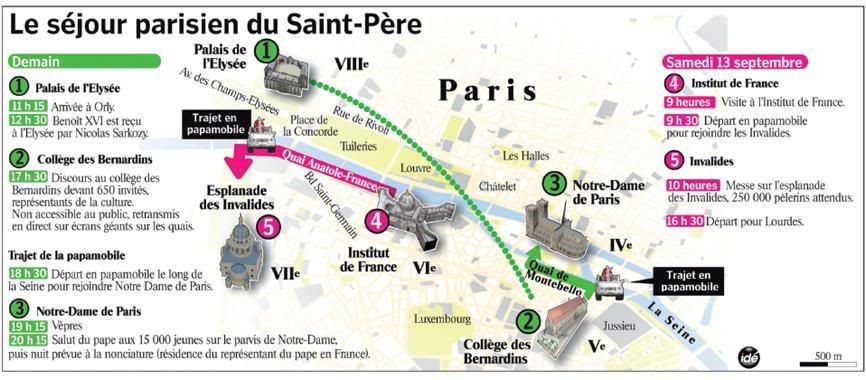 This event map from 'Le Parisien' is self-explanatory.
This event map from 'Le Parisien' is self-explanatory.
[Modificato da TERESA BENEDETTA 11/09/2008 23:54] |
 11/09/2008 22:45 11/09/2008 22:45 |
|
| | | OFFLINE | | Post: 14.963 | Registrato il: 28/08/2005
| Utente Gold | |
|

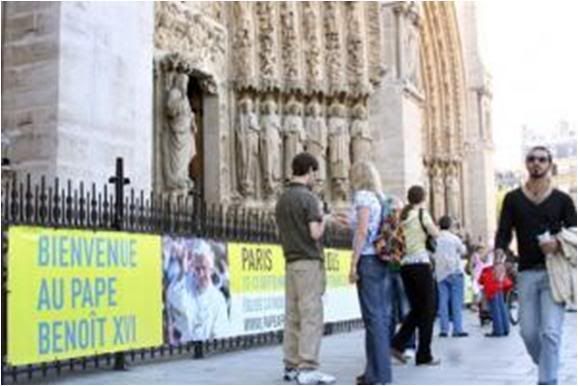 By the front steps of Notre Dame
By the front steps of Notre Dame.
at the center of
a sensitive visit
By Stephanie Le Bars and Henri Tincq
Translated from

Sept. 11, 2008
Two days before his arrival in France, Benedict XVI addressed a message to 'this well-loved nation', underscoring its "tradition for hospitality and tolerance, as well as the solidity of its Christian faith and its exalted human and spiritual culture".
Thus, he set the tone for a first visit pre-announced as difficult, which will end on Monday, Sept. 15, in Lourdes, where the Pope will be taking part in ceremonies for the 150th anniversary of the Marian apparitions.
Starting with his first meeting in Paris, at the Elysee preisdential palace, where Benedict XVI will be welcomed by Nicolas Sarkozy and his wife, the thorny question of the place of religions in the public domain will be tackled.
Notwithstanding the controversy that followed his address on December 20, 2007, at the Lateran Basilica in Rome, Mr. Sarkozy plans to develop again in the Pope's presence his idea of 'positive secularity'.
According to sources at the Elysee, the President will repeat what he has said "before and after his election" on the quesiton of relgions.
On his part, the Pope is not unaware of French tensions about this issue, but at the Elysee, as at Lourdes, he is expected to reaffirm his concept of a 'principle of secularity' which should not keep 'the Church from taking an ever more active part in the life of soceity", as he declared in 2006 when he received the credentials of the ambassador of France to the Holy See.
The sentiment prevails in Rome that, despite some progress, "the French concept of secularity has tended tp marginalize the fiath", as Cardinal Tarciso Bertone has just expressed anew to La Croix.
Since 1992, when the future Pope was installed as a member of the Academie des Sciences Morales et Politiques in Paris, he has made it clear: "It is not the Church's role to be a state or a party of the state.. But it is her role to be responsible for everything and not to keep to herself."
What is the future for the Christian faith in a secularized 'culture'? This will be the second stake of the trip. At the restored College des Bernardins , the Pope will address an audience of 700 academicians, writers, intellectuals, artists - believrs and agnostics - an event without precedent. Fr. Federico Lombardi, the Vatican spokesman, called it 'the most anticipated moment' of the trip.
Two years to the day after his controversial lecture at the University of Regensburg, Benedict XVI will speak again of the relationship between faith and reason. He will seek to share his concerns over the rise of 'moral relativism' and 'subjectivism' which turn man away from all sense of transcendence.
The third challenge for the Pope will be how he will be received in France, where his image has been clouded by a reputation for intransigence. Benedict XVI will be able to measure the fervor of Catholics in a country where practice of the religion has seen a regular decline over several decades.
The faithful hope to get a sense of the style andn thinking of this Pope. As many as 250,000 persons are expected Saturday morning for the papal Mass on the esplanade of the Invalides in Paris, and as many may be present for the Sunday Mass in Lourdes.
For their part, the Catholic hierarchy in France is looking forward to getting 'encouragement to proceed ahead' at their meeting with Benedict XVI in Lourdes, according to Mons. Michel Dubost, Bishop of Evry: "Our problem is that we are being asked to be witnesses to the Gospel in a pluralist and secularized society." [What a strange way to put it! Is that not asked of every Christian, in whatever society we live in - and is the problem not far more difficult for those who must be witnesses for Christ in nations where Christians are a tiny and persecuted minority and whose culture is, by definition, predominantly non-Western, ie, non-Christian?]
The Pope will ask the bishops to be ever more active in society and to 'set to music' this positive secularity.
He will try to justify his decision, in his July 2007 Motu Proprio, to liberalize the traditional Mass, a move that provoked a backlash in France. [He already explained his reasons amply in the letter accompanying the MP - I don't think he needs to do that again. I think he will appeal directly to the French bishops to be generous in their attitude towards the normalization of the pre-Conciliar Mass. Just as the Pope says of Christ, it takes nothing away from them!]
Finally, the question of priestly vocations in free fall, which cannot be avoided since it is crucial for what is to become of a Church in crisis.
 A Pope visiting
A Pope visiting
seculars at home
Editorial
Translated from

Sept. 11, 2008
A red carpet at Orly, a reception and speeches at the Elysee: The Republic will deploy its pomp and circumstance to welcome Benedict XVI, from Friday, Sept. 12, to Monday, Sept. 15,
Such a welcome is completely legitimate. From Valéry Giscard d'Estaing to Jacques Chirac, passing through François Mitterrand, the three predecessors of Nicolas Sarkozy did the same for John Paul II.
The Pope, who yesterday presented himself as 'a messenger of peace and brotherhood', is both the head of state of the Vatican and the leader of a religion which is still the main religion in Frnace, even if its practice has declined and continues to decline.
The papal visit will be an occasion for an exchange of discourses between Mr. Sarkozy and Benedict XVI on the place of religion in society. The President of the Republic will defend once again, as he did in his Lateran address on December 20, 2007, what he calls 'positive secularity'.
M. Sarkozy believes that secularity "does not have the power to cut France off froim its Christian roots". He hopes that the Republic may enrich itself with "a moral reflection inspired by religious beliefs" that has "links to transcendence".
"In the transmission of values and in the apprenticeship of good and evil," he added, "the teacher can never replace the parish priest or pastor."
In the eyes of secular laymen, M. Sarkozy overstepped the line in that Lateran address, in making an apologia (justification) for religion, expressing a view that is more related to Napoleon's Concordat with the Holy See than with defending the law of 1905 on the separation of the state from churches in France.
Unlike his predecessors, Mr. Sarkozy has an unfortunate propensity to mix up his personal convictions - which lead him wich that "more men and women may have hope", in the interest of the Republic - and his role as guardian of a 'secular Republic' which 'respects all beliefs' but does not favor any. [Is there any contradiction there? How can it be wrong to want people to hope, even those whose core conviction is based on nihilistic despair? Expressing such a wish does not impose anything on anyone!]
This 'positive secularity' is welcome to Benedict XVI who would like the Catholc Church to take "an ever more active part in the life of society".
On the eve of his visit, the Pope praised France for its "generous tradition of hospitality and tolerance". It would be a pity if this is belied by sectarian demonstrations which demonstrate a restricted view of secularity.
Religions have a place in society. But the Republic is neutral.
In the interest of fairness, I must point out that Le Monde also features today an opinion piece by a socialist French senator whose thinking appears to embody the blind secularism of people as lunatic as the ACLU in the United States. I would post it right away if I did not have to translate it, but I have other priorities. Here is the link, for those who read French:
www.lemonde.fr/opinions/article/2008/09/11/un-pape-pour-le-choc-des-civilisations-par-jean-luc-melenchon_1094102_3232.html#ens_id...
 Who will be attending
Who will be attending
the Bernardins lecture?
 has this information:
[Many names may not be familiar to those of us who do not follow French culture closely. I can only recognize 4 names, so I'll be running to Wikipedia after posting this to find out who the others are!]
has this information:
[Many names may not be familiar to those of us who do not follow French culture closely. I can only recognize 4 names, so I'll be running to Wikipedia after posting this to find out who the others are!]
Among the 700 representatives of 'the world of culture' invited by the Archdiocese of Paris to the Bernardins to listen to the Pope tomorrow afternoon, there are writers like François Cheng, Philippe Claudel, Gabriel Matzneff, Daniel Pennac, Philippe Sollers; philosphers like Jean-Luc Marion and Régis Debray; theater figures like Olivier Py and Jean-Claude Casadesus; singers Didier Barbelivien and Alain Chamfort; historians like Emmanuel Le Roy Ladurie and Max Gallo; scientists like Yves Coppens; psychoanalysts like Marcel Ruffo and Boris Cyrulnik, but also newspaper and maagzine editors as well as media moguls,
[Modificato da TERESA BENEDETTA 12/09/2008 01:24] |
 12/09/2008 00:44 12/09/2008 00:44 |
|
| | | OFFLINE | | Post: 14.964 | Registrato il: 28/08/2005
| Utente Gold | |
|
|
 12/09/2008 04:49 12/09/2008 04:49 |
|
| | | OFFLINE | Post: 3.314 | Registrato il: 23/11/2005
| Utente Master | |
|
The Pope's Purpose in France
By Jeff Israely / Paris
TIME Magazine
Thursday, Sep. 11, 2008
When the Archbishop of Paris, Cardinal André Vingt-Trois, met with reporters on the eve of Pope Benedict XVI's arrival in France on Friday, he ended up presiding over a heady mélange of funeral and lively TV talk show.
The French press, pointing to the continued steady decline in the number of practicing Catholics and the French state's commitment to godless reason, tried to prod Vingt-Trois into announcing the funeral for European Catholicism in his own backyard. But the Cardinal would have none of it, and the verbal sparks began to fly.
One reporter referred to Catholics as a "minority religion" in France, to which Vingt-Trois complimented the questioner's "slogan," but told him to check his math. "I always thought minority is less than 50 percent," he said. "That's not the case at all." Next, someone cited French Cardinal Jean-Louis Tauran's statement that the Pope would come to Paris to "set the clock straight" on French Catholicism. Vingt-Trois cocked his head, and said such words don't correspond to "Benedict's style." Finally, a questioner declared that the French Church was the Grande Malade (the Sick Lady) of worldwide Catholicism. An exasperated Vingt-Trois finally gave a bit of ground. "Our Church has difficulties, which are quite visible for everyone to see," he said. "But it is not the Sick Lady. Instead, there are signs that it is quite alive."
Alive, perhaps, but just hanging on. Though some 75 % of French citizens are baptized, regular mass attendance is edging below 10%. Even Church weddings have dropped, from 147,000 in 1990 to 89,000 in 2006. Indeed, the most notable new religious energy in the country is increasingly coming from a growing Muslim community.
Even those Catholics who do follow their faith have little hope that Benedict's four-day visit — which will include a mass in central Paris and a visit to the southwest pilgrimage town of Lourdes — can make a real difference. "It will create a buzz, but I don't think it will create a very deep feeling of religion," said Guillaume de Galard, 32, exiting mass on a recent Sunday in downtown Paris. "It will only exist for his time he's here."
It wasn't always this way. French Catholicism is known as the "eldest daughter" of the Church, for having pledged allegiance to Rome in the Second Century; and in the 14th century, the southern town of Avignon even served as the temporary home to the papacy. But France is also where modern anti-clericalism became ascendant with the 1789 Revolution, which eventually led to the thick black line separating church and state known as laïcité, and the arrival of humanist reason as the guiding principle in contemporary culture.
French President Nicolas Sarkozy has poked at this spiritual status quo, using a visit to Rome's Basilica of St. John Lateran to call for a "positive" conception of laïcité, which would also encourage public expressions of faith. Some critics, however, say that the twice-divorced Sarkozy sees the symbolic and historic identification with Christianity as a way to respond to the growing assertiveness of French Muslims.
More than history and symbols, Benedict is aiming at the future — and as he sees it, saving souls. He is keenly aware of the challenge in the heart of his native Europe, which has been drifting from its faith over the past century. Friday marks two years to the day from the most potent moment of his papacy, a provocative discourse at the University of Regensburg about how faith and reason can, and must, coexist. Though the Sep. 12, 2006 speech is best remembered for its citation of a Byzantine emperor's insults of the prophet Muhammed, which sparked Muslim outrage, the intended target of the Pope's words were the increasingly secularized Europeans.
The Pope's centerpiece speech in France is expected to come at the College des Bernardins in front of academics, cultural leaders, representatives of Islam, and European Union and United Nations officials. Some in the Vatican press corps have billed it Regensburg II, though few expect it will trigger any anger among Muslims.
While Benedict continues his efforts to stir Europeans with his ideas, there is also the work to be done on the ground. Georges Kouakou, 50, remembers the Western missionaries when he was growing up poor in his native Ivory Coast. Having emigrated to France, Kouakou, a computer engineer and father of three, regularly attends mass at Notre Dame des Victoires church in central Paris. The pastor to the mostly native French parishioners there happens to be from the Congo. "There's been an evolution," Kouakou says. "Europeans went to evangelize Africans; today it's the reverse, and Africans are now evangelizing. These are the seeds that God planted."
Optimists like Kouakou, and Cardinal Vingt-Trois, may see another hopeful seed in the arrival in the Enlightenment's birthplace of the Enlightenment of a Pope committed to reconciling faith and reason. Others may say the funeral on French Catholicism has already begun.
[Modificato da benefan 12/09/2008 04:50] |
 12/09/2008 08:36 12/09/2008 08:36 |
|
| | | OFFLINE | | Post: 14.965 | Registrato il: 28/08/2005
| Utente Gold | |
|
 '
A love for 'la douce France'
by Isabelle de Gaulmyn
Translated from

Sept. 11, 2008
Immersed since his Bavarian childhood in the French culture which he so admires, Benedict XVI is also a tireless critic of the Enlightenment, responsible in his eyes for the crisis of faith in Europe.
Le Soulier de Satin (The Satin Slipper) by Paul Claudel is a work that the Pope would not have put into his suitcase. But one imagines the book, with its cheap cover, as schoolboys bought it in his time. Because it was as a young student, in a Germany that had been destroyed and humiliated, that Joseph Ratzinger watched a performance of Claudel's play.
"It was at an important turning point in my life," he disclosed in 1998, in an amazing confession of his 'love for 'la Douce France': "The symbolism of love, of the fecundity of renunciation, of divine grace within human weakness, was transformed for me into a personal message, a fundamental direction of the path of life that I should take."
That the passionate and baroque beloved of Prouheze, transformed by suffering and death, could impress someone we imagine to have been at the time a wise young seminarian says much about the extreme spiritual sensitivity of Papa Ratzinger.
It is also the mark of a childhood immersed in French culture. Ratzinger's Bavaria, he says in Salt of the Earth, preferred France to Prussia [as a cultural model].
And this man who never lived in France has perfect mastery of its language. He speaks English with a heavy German accent, but not French.
French culture marked his youth, and theology guided his beginnings as priest and teacher. In what he hinmself described as "one of the greatest gifts I have received in my life", he became friends with Henri de Lubac, a friendship that ripened during Vatican-II. Claudel, De Lubac, but also Bernanos, Mauriac, Peguy, Congar: the Pope was fascinated by 'noble France' and its 'humanist culture'.
The ground which Benedict XVI will touch today on his seventh European trip is also the country of the Enlightenment, that century which this theologian-Pope has not ceased to question, and which he will meet again when he addresses the world of culture Friday afternoon.
In Paris, the Pope comes to confront this other Europe, that which in the wake of the Encyclopedists and the ensuing French Revolution, ejected God from the field of reason, claiming to be able to define moral norms without God, opening the door to a secular positivism which consigns fundamental questions of ethics and religion to the realm of subjectivity.
In a way, France is the nation-symbol par excellence of the evolution of the Old Continent towards the secularization that so concerns the German Pope.
"Will there come a day when on this continent only the stones will speak of Christianity?" he asked in Vienna in 2007.
What will he say of France? In Rome, no one knows better than him the statistics on the decline in practising Catholics, the decline in vocations, the lack of priests in France.
France was also the nation that excluded any mention of the Christian roots of Europe in the European Constitution - for Benedict XVI, a sign of the its desire to cut itself off from that which gives it life. Where can he address this question better than in the heart of the City of Lights?
By choosing to speak at the Bernardins, Benedict XVI has not opted for an easy time. If he succeeds in getting his message through, then France, symbol of secularism, can become the crucible for reflecting on the renewal of Christianity in Europe, a Christianity that would be clearly situated within contemporary debate.
After all, does not Partage de midi(Noon break)[one of Claudel's earliest and most famous plays] carry a phrase of St. Augustin as epigraph, etiam peccata* [even sins]
[*I had to look this up - Augustine added the phrase to a line from St. Paul, "To those who love God, all things work together unto good" (Rom 8,28)]. that is reprised by Prouheze's guardian angel: "Even sins! Sins also serve..."
A note on 'The Satin Slipper':
The Satin Slipper is a play of 52 scenes presented on four different days.
It is all about history, God and the sense of divine mission that helped spur the age of exploration. Rodrigue is a Spanish knight and conquistador whose explorations carry him to the Americas, the Philippines and Japan. The play follows him from a vigorous young manhood to an eccentric late middle age, when he has lost a leg. His status also changes from that of one king's golden boy to another's whipping boy.
Dona Prouheze, the love of Don Rodigue's life, is a French Catholic of exceptional beauty who is married to a governor. Although she returns his love, their relationship remains unconsummated by her intention. Over time, she becomes more than just a romantic icon. She is an earthly manifestation of divinity.
In the service of God, Prouheze forsakes a comfortable life in Spain to oversee a Spanish citadel in Morocco. When her husband dies, she marries a ruthless adventurer by whom she has a daughter. She presents the child to Rodrigue as his spiritual child. Rodrigue's idealization of Prouheze ultimately transforms him from an adventurer into a utopian idealist who holds out a vision of a united Europe to a scornful king.
Perhaps the greatest accomplishment of "The Satin Slipper" is its success in depicting the religious fervor that drove the Spanish explorers to sail into the unknown and establish their fragile colonies. Although the desire for earthly riches certainly had a lot to do with it, these expeditions were also holy crusades. Fueled by a burning belief in Roman Catholicism as the one true faith, their aim was to save souls who would otherwise be damned. That fervor was bound up with nationalist fanaticism and the notions of divine right. And so, religious urgency was often seen to justify all manner of carnage and brutality.
 The unknown Benedict XVI
The unknown Benedict XVI
by Philippe Demenet
Translated from

Who is he? What does he think? What does he want?
The 265th Pope in history is not easily described. Some of those who have worked with him, past and present, have nonetheless given us some leads to better understand him.
"Humble and shy", "simple and accessible", "kind and attentive to everyone". Past and present collaborators all use the same words to describe this Pope who prefers one-on-one meetings to crowds, staying behind the scenes to the glare of media lights.
Benedict XVI, who is visiting France for the first time as Pope, is not a man who reveals himself.
"He plays the piano, he loves to cite Bertholt Brecht, and likes cats, who are quite 'individualists'," says Wilfried Roehmel, who was his spokesperson when he was Archbishop of Munich-Freising from 1977 to 1981.
Is it this natural reserve that gave rise to so much incomprehension so that a great part of the media came to refer to him as Panzerkardinal, pessimistic and curt?
"But this is a man who radiates joy in his own way," bristles Fr. Joseph Murphy, an Irish Jesuit who works for the Vatican Secretariat of State. "You can feel the joy within him. He is a calm, peaceable man."
A Roman prelate describes him as a "great worker, who pursues every thought to the end with great intellectual rigor" and is a boss "one loves to work for - he gives confidence; but he is also someone who can erupt unexpectedly in extraordinary fits of laughter!"
The former Cardinal Joseph Ratzinger, who was Prefect of the Congregation for the Doctrine of the Faith for 24 years - and thus, the vigilant guardian of Catholic dogma - obviously does not fit any of the tags that have been given him by the media.
"I always thought him calm and kind," says Mons. Joseph Dore, theologian and emeritus Archbishop of Strasbourg, who was his student in Muenster in the 1960s.
"In the amphi [lecture hall], we called him 'Mellifluus' [river of honey] for his gentle way of speaking. He is a very great theologian, who knows par excellence the tradition of the Church as well as contemporary thought."
Born in Marktl-am-Inn on April 16, 1927, Joseph Ratzinger "embodies Bavaria - not the caricature Bavaria of beer and sausages - but the spiritual Bavaria, of piety, or onion-shaped bell towers, of Catholicism with joie de vivre, nourished by the beauty of the land, of outdoor Masses on meadow lands," says Roehmel. Nazism was not welcome at all in this Catholic Bavaria.
As a schoolboy, Joseph saw his parish priest beaten up by the Nazis, and the women of his village protest the suppression of the Cross in schools. He also saw the Brown-shirts assault the archbishop's palace in Munich when the Archbishop dared to recall the Jewish roots of Christianity. He had a Downs syndrome cousin who disappeared one day, most likely put to death by the eugenistic Nazi state.
His father, a policeman who chose early retirement, called Hitler an anti-Christ from his first victories. But he would see his two sons, Georg and Joseph, conscripted into the Nazi machine - Georg sent off to the Italian front, Joseph to an anti-aircraft station outside Munich.
Among the war ruins of Germany, the Ratzinger family welcomed the Allied landings in Normandy as liberation. Ordained in 1951, Joseph was assigned to a parish. He would come away from this brief exposure with the belief that in some ways, the Church should adapt itself to the times.
Earning his doctorate in theology, he became a professor in Munich, then in Bonn, and participated in the second Vatican Council as theological 'expert' or consultant to Cardinal Josef Frings of Cologne.
It was there he became friends with Henri de Lubac, outstanding theologian and 'Christian humanist'.
He had been seduced by French culture from his schooldays, immersing himself in the great French writers, including contemporary masters like Claudel, Mauriac, Peguy, Bernanos, Anouilh and even Sartre.
He has given several important lectures here in France, delivering them in perfect French.
"I have always been, since my childhood, a zealous admirer of 'la douce France'," he said in 1998, when he was named a Commander of the French Legion d'Honneur.
"The Pope has obvious love for France", says a diplomat in Rome, "but France is also, for him, a source of great concern because of the scarcity of vocations, and the loss of influence by the Church..."
Something broke within him after Vatican-II - as of a great hope that had been betrayed. Starting in 1966, he declared his 'disenchantment'. Two years later, he watched, horrified, as the student rebels of 1968 went over the top and beyond the line.
He sounded an alarm, and has been doing so, ever since. Some liturgical innovations seemed vapid to him, voided of significance. 'The opening to the world' that Vatican-II
intended was turning into 'a surrender' instead.
But the progressivists were not the only ones he took issue with. He criticized the 'fundamentalists' as well, those who "in the name of a Pope from the past now refuse to obey the Popes today". He has sought to
In 1981, John Paul II named him to head the ex-Holy Office in order to enforce doctrinal discipline and avoid having the Church fall to pieces.
Elected Pope at age 78, Joseph Ratzinger keeps the same people around him [adding a few members necessary to the papal household) and leads the same monastic lifestyle, regulated 'like a German metronome'.
Christian unity and Church unity remain his obsession - but not at any cost. Pointing to the documents from Vatican-II, he has been determined to show that the Council never sought a 'rupture' in the Church, but inscribed itself into the long line of a living tradition.
"Here in Munich, in his time," recalls Roehmel, "every opinion had a full right to be heard as long as it was well argued. When conservatives and progressives clashed, he sought to make them live together."
"As gentle as he is, the Pope will not yield on matters of truth and does not want Christians to fold up when the truth is at stake", notes Mons. Dore.
Just ask the Protestants who profess to be shocked by certain Vatican documents, or the Muslims who profess to have been 'scandalized' by the Regensburg lecture and his public baptism of an ex-Muslim. They know!
[So far, so good - as long as the writer is quoting people who have known Joseph Ratzinger. After this, it gets really rocky - when the writer is winging it by himself, and all the facile cliches are trotted out, unexamined!]
"The Pope proclaims the truth, whether it is pleasing or not - and that is probably the source of his difficulties," says a Roman observer. [How does he know that the Pope considers them 'difficulties'? A Pope has far larger concerns than indulging in hurt vanity because he is misunderstood!]
"One does not need to impose the truth," says Mons. Dore, "but to propose it in a way that the other side understands and feels free to accept it or not."
Among his lesser 'truths', Benedict has pointed out that Vatican-II never prohibited the traditional Mass nor abrogated it, even though it was virtually suppressed after the 1970 liturgical reform. He considers the traditional Mass more beautiful, more profound, more conducive to transcendence.
At the risk of shocking some, the Pope could say the Mass in Latin, has said it facing the altar [the writer uses the phrase 'with his back to the people'] and distributes communion on the tongue to kneeling communicants.
His new master of liturgical ceremonies has given him papal vestments from the 19th century. "It's because the Pope cares about liturgical beauty," says an observer. "He wants the supernatural to be palpable, and felt."
Through a Motu Proprio (personal decree) normalizing the celebration of the traditional Mass if some conditions are met, Benedict XVI sought to take away what was a 'main obstacle' that had led Mons. Marcel Lefebvre and some of his fundamentalist followers to schism in 1988. But the Lefebvrians have refused the hand held out to them. And some Jewish leaders have protested a Good Friday prayer for the conversion of Jews. [This writer is simply repeating wrong ideas by rote!]
Not disposed to managing people, politics or frequent travels [even were it not a question of his disposition, a Pope is not supposed to manage people or politics - he is neither a bureaucrat nor a politician - and the limited travel is a function of his age; but none of the stories I have seen so far from these French writers except Henri Tincq seem to consider that they are discussing an 81-year-old man!], Benedict XVI has delegated to his 'prime minister' the task of deploying Vatican diplomacy abroad and managing the Curia [both of which are the traditional functions of the Secretariat of State, so the Pope is not innovating anything], while he takes care of the Magisterium.
Africa and Asia are alien to him. [Hey, ignoramus! Have you never read the Asian, African and Latin American bishops recounting how the Pope seems to know what there is to know about their home situation, and not just about their local Churches?]
But he attaches particular attention to Europe, whose 'apostasy' [breaking with its Christian patrimony] he has denounced, as he has 'the dictatorship of relativism' - in which, without an absolute concept of good or evil, each one would be free to formulate his own morality according to his desires.
Is David trying to fight Goliath? [Wow! How presumptuous! The demographically agonizing Europe a Goliath?]
Benedict XVI "calls on Christians, even if they may have become a minority, to oppose the dominant culture," says an observer. [Who the hell are these observers and how many are there? There has got to be a more plausible way for a reporter to describe his sources, if they are genuine - if he is just making them up, every quote ends up being attributed to 'an observer'. As for this last quote, the writer did not need any 'observer' to tell him. he could have quoted Benedict directly from any nmuber of recent homilies!]]
To help them, he reminds them all the time of the treasures of their faith and shows them Mary as the model Christian. In his audiences, his encyclicals, his books, "he is addrssing himself above all to Catholics - he wants them to enlighten them, help them to be searchers of the truth, which is to say, searchers of God. The more they are solid in their faith, the more they can help others."
It is a teaching that has served him well. In the United States, where he met with some victims of pedophile priests, as well as in Austrlia, "direct contact with Benedict XVI contributed to change opinion about him, to muzzle his critics," recalls Fr. Murphy. "His presence in France will help people to appreciate who he is and it will make them want to read him!"
[Modificato da TERESA BENEDETTA 12/09/2008 08:39] |
 12/09/2008 09:28 12/09/2008 09:28 |
|
| | | OFFLINE | | Post: 14.968 | Registrato il: 28/08/2005
| Utente Gold | |
|

 TO THE HOLY FATHER
TO THE HOLY FATHERAPOSTOLIC VOYAGE TO FRANCE
OF HIS HOLINESS BENEDICT XVI
ON THE OCCASION OF THE 150TH ANNIVERSARY
OF THE MARIAN APPARITIONS IN LOURDES
September 12-15, 2009
P R O G R A M
Friday, September 12
ITALY
Fiumicino (Rome)
09.00 Depart from Leonardo da Vinci international airport for Orly (Paris).
FRANCE
Paris
11.10 Arrival at Orly airport.
- Official welcome ceremony.
12.25 Welcome ceremony at Elysee Presidential palace.
- COURTESY VISIT WITH THE PRESIDENT OF FRANCE.
13.00 MEETING WITH FRENCH OFICIALS, Elysee Palace.
- Address by the Holy Father.
17.00 MEETING WITH JEWISH REPRESENTATIVES, Apostolic Nunciature in Paris.
- Address by the Holy Father.
17.30 MEETING WITH THE WORLD OF CULTURE, College des Bernardins.
- Address by the Holy Father.
19.15 VESPERS CELEBRATION WITH PRIESTS, RELIGIOUS, DEACONS AND SEMINARIANS, Notre Dame Cathedral.
- Address by the Holy Father.
20.30 GREETING TO THE YOUTH, Notre Dame Square.
- Address by the Holy Father.

OR today.
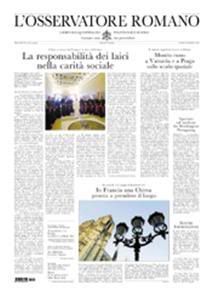 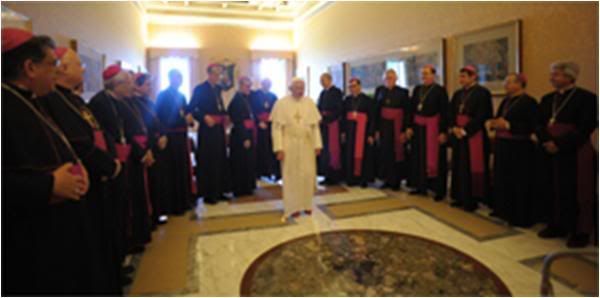
The Holy Father speaks to the bishops of Paraguay on ad-limina visit about
'The responsibility of lay faithful in social charity'
Other Page 1 stories: Russia warns Warsaw and Prague against hosting the US-built missile shield; USA and North Korea agree
to proceed with denuclearization talks; and an article by the Archbishop of Paris on the state of the Church in France,
the first of three articles on the Pope's trip to France in today's issue.
[Modificato da TERESA BENEDETTA 12/09/2008 09:48] |
 12/09/2008 12:27 12/09/2008 12:27 |
|
| | | OFFLINE | | Post: 14.969 | Registrato il: 28/08/2005
| Utente Gold | |
|
 In France, a Church
In France, a Church
ready to 'set sail'
By André Vingt-Trois
Cardinal Archbishop of Paris
Translated from
the 9/12/08 issue of

Within a few hours, Pope Benedict XVI will begin his first apostolic visit to France. As Cardinal Ratzinger, excellent connoisseur of French culture, he has visited our country many times.
On many occasions in the past 25 years, he has been invited to speak in France before diverse audiences: at Notre-Dame de Paris, at the Academy of Moral and Political Sciences, at the Sorbonne, and even in Caen, Normandy, on the 60th anniversary of the Allied landings in 1944.
We are very grateful for the honor to us by agreeing to extend his pilgrimage to Lourdes with a brief stop in Paris first, which would give his visit an undeniable national dimension.
In the course of the celebrations in Paris and Lourdes, the Pope will meet a significant representation of Catholics in France. Moreover, he personally asked to meet with the French bishops' conference after the concelebration at Lourdes with all the French bishops.
Therefore, we will be experiencing and witnessing a true encounter between the Pope and the Church in France.
This Church has often been criticized, even mocked; it has been depicted here and there as a field of ruins on which just a few groups have managed to survived. This view is profoundly unjust and incorrect.
Of course, the reality of our church is a troubled one, and in some ways, confused. Nonetheless, even if we must acknowledge a decline in traditional practices (Sunday Mass, baptism of babies, catechism, etc), at the same time we must give thanks for the vitality of communities (adult baptisms, summer assemblies, youth gatherings, etc) and for the increased involvement of faithful whose membership in the Church is more truly motivated and who have made well-deliberated choices.
There is no longer a Christian unanimity - if there ever was such - but the Christians are there, alive and active, occupying themselves with the life of their communities.
They take responsibility for financial matters, which is a French tradition that has been entrenched for more than a century now. They are involved in the daily functioning of their parishes. And above all, they take active part in the mission to announce the Gospel in every aspect of their own life.
The situation in our Church can be explained by the changes in social life which have characterized the past half century. The massive migration of traditional rural populations to urban agglomerations - with all the upsets that this exodus brings about - and the consequent loss of their usual reference points, have profoundly marked our society and the conditions for social transmission in the family, at school and in the Church.
At the same time, the development of different cultural and religious expressions, particularly of Islam and Buddhism, has transformed the religious scenario in our country.
The decline in vocations for the priesthood and the religious life, whose first symptoms were already perceptible around the time of the Second World War, has also aggravated the fragility of the Catholic universe.
Before all these transformations it was inevitable that we are called on to discover a form of vitality for the Church that is different from what it was in the 19th century and the first half of the 20th century.
What we are living through is a true bereavement. Shall we live it as the end of one world, or should we not rather try to discern in this crisis the path that God wants us to take? That is the great challenge we face.
Such a challenge is even more important in that it is imposed on us at a time that is exceptionally propitious for announcing the Gospel. The social changes I have mentioned come with a certain confusion about the concepts of the world to which we were used. The promise of radical change, the great technological advances, the political programs, the logic of economics - none of it seems able to guarantee a future of security to our contemporaries.
While the emphasis on individualism impels everyone to protect his own beliefs and to ask of society a protection against the risks of life' that is somewhat like an insurance policy, economic and financial globalization shows that many decisions important for the life of everyone appear to escape control by anyone.
The fears, justified or imagined, which come from this accentuate the tendency to protect the self and thee obsession against having to share one's disposable goods.
A concern for the ecology, as well as the idea of sharing resources and division of labor, can hardly be heard in such circumstances. Everyone will want to defend their level of life, but they know very well that national and international inequalities will certainly not allow them to hold on to their own prosperity.
What will become of us?
In this context, announcing the Gospel assumes a particular resonance.
Its message of hope opposes the temptation to fatalism: humanity is not disarmed against the risks that it runs.
Its message of life is opposed to the law of 'each one for himself' and invites to developing solidarity in our country, as in dealing with the nations that are the sources of immigration.
Its message of truth is opposed to the illusion that all opinions are equivalent and that there us no way to choose among various concepts of life.
The passion it has for the dignity of man is opposed to all kinds of instrumentalization of the human being and all attacks on his dignity from conception to death.
These words of truth, love and hope we received from our Christian tradition. It is up to us now to assure that they are put into practice and that they are transmitted to future generations.
Those who today seek reasonably to build a society that is more just and peaceful are more disposed than in the past to listen to what Christian wisdom can contribute for the good of all.
In other eras, ideological sectarianism or the illusion of political messianism did not allow open changes which are now possible and often wished for. The time has come for us to "answer whoever asks for the reason of the hope that we bear in us" (1 Pet 3,15).
It is not the time to seek refuge in a protective counterculture. It is the moment to 'set sail' in order to respond to the aspirations of our contemporaries and to announce the Good News which we believe.
In this context, the apostolic visit of Benedict XVI will be an important moment in the journey of our church. It will work in three directions, each inseparable from the other. Above all, it will be a great testimony of Christian through the different celebrations presided over by the Pope.
He is not coming here to hold meetings. He comes to celebrate faith in the Risen Christ. His testimony to the faith will be experienced by the crowds that will surround him, but even by the faithful who are hesitant or doubtful will see that even today, the Gospel continues to be a force in the world.
The Pope's visit will be a moment of intense communion with the French bishops, not only in the celebrations in which they will participate in the single liturgy of the Church, but also in the meeting which will join us to him in dialog.
Finally, through the lecture that we will give it the College des Bernardins the Pope will allow us to benefit from his long reflection on the situation of the Christian faith in contemporary culture and on the relationship between faith and reason.
That is why we look forward to his visit with joy and confidence. The Catholics of France have been preparing for months, but i also know that many of our fellow citizens who are not Catholics await him with sympathy and interest.
 Towards an intellectual rebirth
Towards an intellectual rebirth
which is urgently needed
by Alain Besancon
Member, Institut de France
Translated from
the 9/12/08 issue of

The recent trips of Pope Benedict XVI to the United States and to Australia were a success. In both countries there had been prejudices and apprehensions.
They feared the stern Prefect of the Congregation for the Doctrine of the Faith. But they quickly appreciated the gentleness of his character, the broadness of his views, his moderation of action - and the prejudices evaporated.
This turnaround was quick for a simple reason: in both those countries there is a dense Catholic fabric, sustained by a climate of fervent and general Christianity. The Pope was awaited by everyone with sincere goodwill. [I'm not sure that was the case at all! Such a falsely idealized view of the situation in the USA and Australia does not take into account, for instance, the widespread practice of cafeteria Catholicism in both societies.]
In France, the situation is quite different because the context - as it has been observed many times - looks rather grim, and it could be even worse than what it appears to be.
But in matters of the Church it is nonetheless difficult to make a general judgment. [But he just did, about the Catholics of the US and Australia!]
One cannot know where the Spirit will breathe, nor where the dough is rising, if at all. [A reference to Christians being yeast in society.] The impression of disaster conceals any forces for renewal which are as yet hardly perceptible.
But there exist new communities, and it is to be hoped that they are capable of giving intelligent and serious theological education in order to nourish the right fervor.
There also remains an underlying Catholic collective memory that pilgrimages bring out, especially in Lourdes. In the university world, the young generation is not hostile to the Church. Many work with wisdom and talent, and perhaps they may be preparing the intellctual rebirth that the Church urgently needs.
The Holy See is actively aware of the gravity of the situation and has been giving all the help it can give. John Paul II visited France eight times, just one less than his own native Poland, and much more than any other country.
Benedict XVI is about to visit Lourdes, the reservoir par excellence of profound French Catholicism.
He will also visit the Institut de France, of which he is a member, and he will speak of culture in a medieval college, that of the Bernardins, which was in ruins for more than two centuries and now almsot miraculously restored.
The people, on one hand; thought on the other. The perspective looks good. Benedict XVI will be well received.
[Modificato da TERESA BENEDETTA 12/09/2008 13:30] |
|
|
|
|